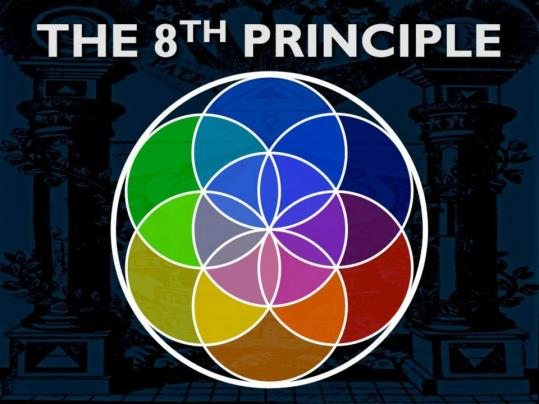

Based on Mark Passio’s Natural Law Seminar
by Michael Gleeson
This thesis is based entirely on Mark Passio’s Natural Law Seminar. If the information presented here resonates as true to you, I very highly recommend checking out for yourself his work, and researching the topics written about in this thesis. There are numerous others who have covered natural law and its workings, but I find Mark’s material, and what comprises this thesis, to be the most important aspects of it. I have tried to make every concept that is written about as clear as possible, but if there are certain things of which you don’t know what they are, or that you don’t understand, I recommend just looking them up on the internet. The last that is being asked of you, is to just believe anything you read here.
When I started researching this topic some years ago, at first, I didn’t fully grasp the importance of it, it was just another set of ‘rules’ to me. But for some reason, I felt compelled to do some more research, and by doing so, I was able to connect the dots, see the big picture, and the current human condition for what it really is. I wrote this because I feel that once somebody comes to a deep understanding of this knowledge, they will almost be obliged to live according to it, or to know for a fact that their behaviour is immoral and wrong.
I find that a quote by Mark Passio himself describes this quite well:
In a time of such overwhelming ignorance of this critical information, the fact that I do understand it, places me in a position of moral obligation to speak this information to others, in an attempt to help them to understand it, and live it, as well.
This man is not a ‘guru’ of any kind, nor does he claim to be. It is simply about the information being presented: not the presenter, or the way it is being presented that matter.
This first section is called ‘Before we Begin’, and ‘begin’ is the key word here: this is an initiation into very deeply esoteric material, that has been hidden from humanity for decades.
If you feel that the current human condition and life on Earth are tolerable just the way they are, and you are content with our global situation as it is now, then there is nothing for you to find here. The information you will encounter in this thesis is not new information. While it will most likely be new to most who read it, all of this information can be found in numerous different books, seminars and lectures written by numerous different people. As the old saying goes: “There is nothing new under the sun” (Ecclesiastes 1:9). This simply means that truth is singular and eternal. It has always been here and will always be here: it is our perceptions that must be aligned to it.
Some of you are likely to be angered by some of the things you are about to read, so be it. The fact of the matter is that truth itself, by its very nature, is belligerent — because it ‘wages war’ against all forms of falsehood and deception.If you wish to take away any real value from reading this thesis, you should make a deliberate effort to be consciously aware of any impulses you may have to reject certain information presented, solely based on your initial emotional reäction to it. It is a logical fallacy to gauge the veracity of any information based on how you feel when first hearing it — because you cannot ‘think’ with the emotions. If you read something you don’t like, or something that angers you, that’s OK, feel the emotion. But don’t immediately tell yourself it can’t be true.
Of course you shouldn’t just believe anything you read here either. It’s about checking the information for yourself, and to actually start researching this material for yourself. And this is a great place to start that journey.
However, this entire thesis is a tapestry. Like pieces of a huge jigsaw puzzle, it is meant to be seen and taken in as a whole, in its entirety. It is highly recommended that you read the entire thesis from beginning to end, otherwise, you will most likely not recognise the patterns inherent to the tapestry.

A person’s teachability, or their ability to learn by being taught by another, is extremely dependent upon the open-mindedness or closed-mindedness of the person being taught. Low teachability derives from arrogance and rigid scepticism, but also from naïveté and gullibility. High teachability derives from a balance between healthy scepticism and an open-minded willingness to learn, and more importantly, the willingness to change.
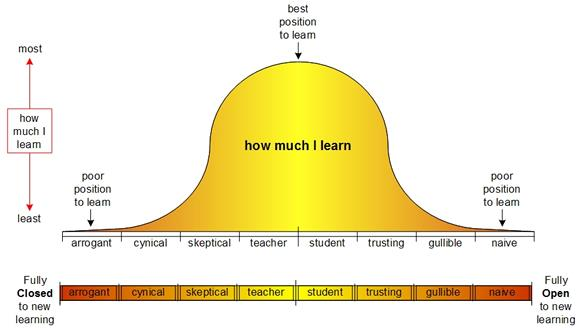
People should consider with great care their sources for information. Because by refusing to present certain information, and by influencing people to dismiss certain information as unimportant or unnecessary to consider, many modern institutions (like the mainstream media, or so-called ‘educational’ institutions) seek to control human perceptions, and by doing so, limit what human beings may come to understand. By limiting what a person is able to understand, a person is automatically limited in what they are able to do, what they are able to change, and what they are able to create.
So again, you should not just believe anything you read here. You need to look into the information written about in this thesis for yourself — and most importantly, personal introspection is necessary — to really feel within whether or not this information resonates with truth. Every person has that intuitive capacity to a certain degree.
People everywhere say that they want certain conditions to be present for both themselves and their species as a whole, such as happiness, health, peace, freedom and so forth. Which of course, are all great things to aspire to, and most people will say that they want these things. However, it feels as though they aren’t being completely honest with themselves, because when they are told that those aren’t automatic conditions that manifest themselves, and that there are specific requirements for us to obtain these conditions, they usually don’t want to hear about it. Also, people wouldn’t say they want these conditions if the conditions were already omnipresent. People say they want something because they don’t already have it, whether it be partially, or in full.
This is what the real law of attraction is about: it explains that conditions of which you say you want them, don’t automatically manifest by thinking of them, or just having a feeling about them. There are certain requirements for obtaining those conditions. Of course, this statement only counts if you want something to be different than the way it already is. If if you’re completely OK with the way things are now, these requirements doesn’t exist.
We need to know certain things. Knowledge that will ultimately lead us to positive action is required. Specifically, the knowledge of the requirements to obtaining the conditions we say we want. However, if this knowledge is absent it obviously can’t be obtained and used to create change. But if it is present, then it must be wilfully being ignored, and as long as this knowledge continues to remain unknown or ignored, the manifestation of the desired conditions will be impossible. And that is exactly what this thesis is about: what those requirements are, and what this knowledge consists of.
This knowledge is ‘occulted’, meaning it is ‘hidden’. It is derived from the Latin adjective ‘occultus’ which means ‘concealed / hidden from sight’, which is in turn derived from the Latin verb ‘occultare’ which means ‘to keep secret / to conceal.’ Just like in English, the word ‘ocular’ means ‘related to the eye / related to sight’, which is derived from the Latin noun ‘oculus’ meaning ‘eye’.
Occult knowledge is certain information that has been ‘hidden from sight’ for a specific reason. Occult knowledge constitutes both the knowledge of human consciousness and how it operates, and the knowledge of natural law, the unseen universal spiritual laws which govern the consequences of human behaviour. In the ancient mystery traditions and occult schools, these concepts are known as the two ‘arcana’ which translates to ‘secret’ from both Latin (arcanum) and Greek (μυστικό, mystiko).
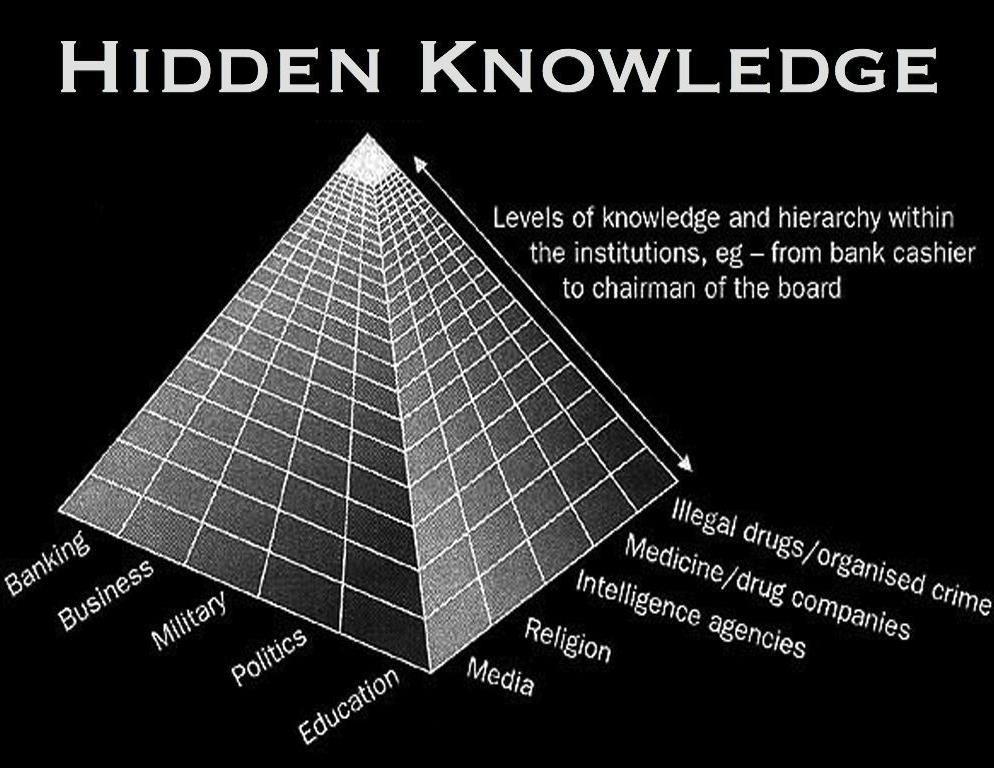
The Lesser (Minor) Arcana: Hidden knowledge of the microcosm. — Deals with individual units of consciousness, the human psyche. → How it operates, where our motivations come from and so forth. (‘lesser’ does not mean it is less important, but simply that it’s ‘smaller’)
The Greater (Major) Arcana: Hidden knowledge of the macrocosm. — Understanding of the larger (universal) laws of Nature that govern the macrocosm. → Natural Law.
The word ‘natural’ is derived from the Egyptian word ‘neter (ntr)’ which translates to ‘spirit / god’ and the suffix ‘-al’, which, just as in English, means ‘related to / of / having come from’. Therefore, it can be readily seen that the word ‘natural’ (neter + -al) means ‘related to’, or, ‘having come from spirit / god’. Representing a force which was known to exist through its observable effects, but difficult, or sometimes impossible to see with the eyes, for example, the wind. The Egyptian word ‘ntr’ was actually pronounced /netʃər/(ne-cher), extremely close to the English pronunciation of the word ‘nature’ — /neɪtʃər/(nay-cher).
Natural Law: Universal spiritual laws which govern the consequences of behaviour for intelligent species; meaning, beings that are capable of coming to an understanding of their own existence, and their consciousness. And also capable of understanding the objective difference between harmful and non-harmful behaviour towards themselves and other beings. This does not include the animal kingdom. For the very same reason you wouldn’t attempt to teach mathematics to your cat or dog, this same goes for animals understanding natural law. This is because we don’t share the same level of consciousness. There are differences in levels of consciousness, and a being’s abilities to comprehend information. Not every being has the ability to come to an understanding of how something like natural law works. Therefore, we are held to different standards when it comes to us understanding natural law.
Sadly, within the human population such knowledge also isn’t commonly known, because it has been deliberately hidden in order to create and maintain a power differential between those who know that information, and those who are ignorant of it. The knowledge of natural law and the way it works in the world around us, constitute some of the most deeply occulted information on Earth, which the powers that be seek to keep hidden from the people, because the understanding of this information would level the playing field and put an end to the currently operating systems of control.
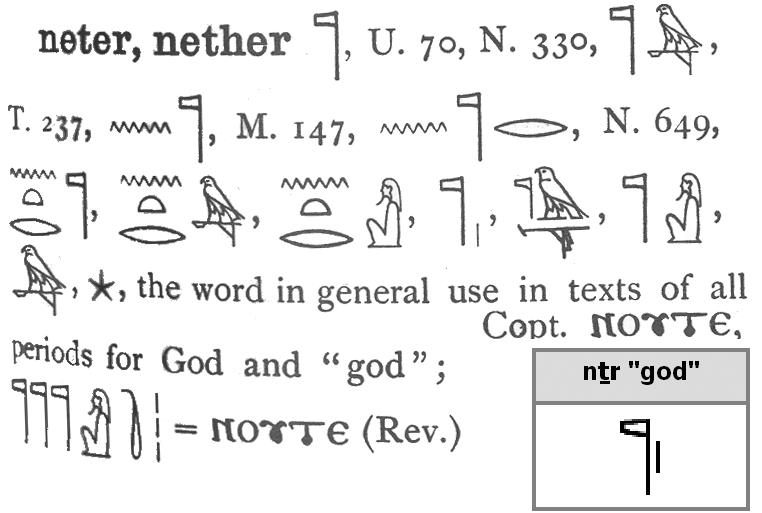
A very clear distinction must be made between nescience and ignorance, so that the difference between these two concepts is fully understood. The term nescience is one that has been practically ‘deleted’ from colloquial English.
There are two contexts to not knowing something: the first term ‘nescience’ is derived from the Latin verb ‘nescire’, which means ‘to not know something because necessary information was absent or unattainable’. The prefix ‘ne-’ in Latin means ‘not / not present / absent’. The second part of the word nescience is derived from the Latin verb ‘scio / sciero’ which means ‘I know’. Therefore, in case of nescience it is impossible for a person to aggregate necessary information. Contrary to ignorance, nescience isn’t a person’s fault: the information simply isn’t available for them to perceive.
The term ‘ignorance’ is derived from the Latin verb ‘ignorare’ which means ‘to not know something, even though necessary information is present — because that information has been wilfully refused or disregarded’. This is usually because of disinterest or contradicting beliefs. Ignorance, contrary to nescience, carries blame. Because the person has wilfully chosen to ignore the information.
For the vast majority of people this information is readily available to them, but most people choose to ignore it because they feel they don’t need to know it, or because it contradicts something they believe in. Therefore, we live in an ignorant society.
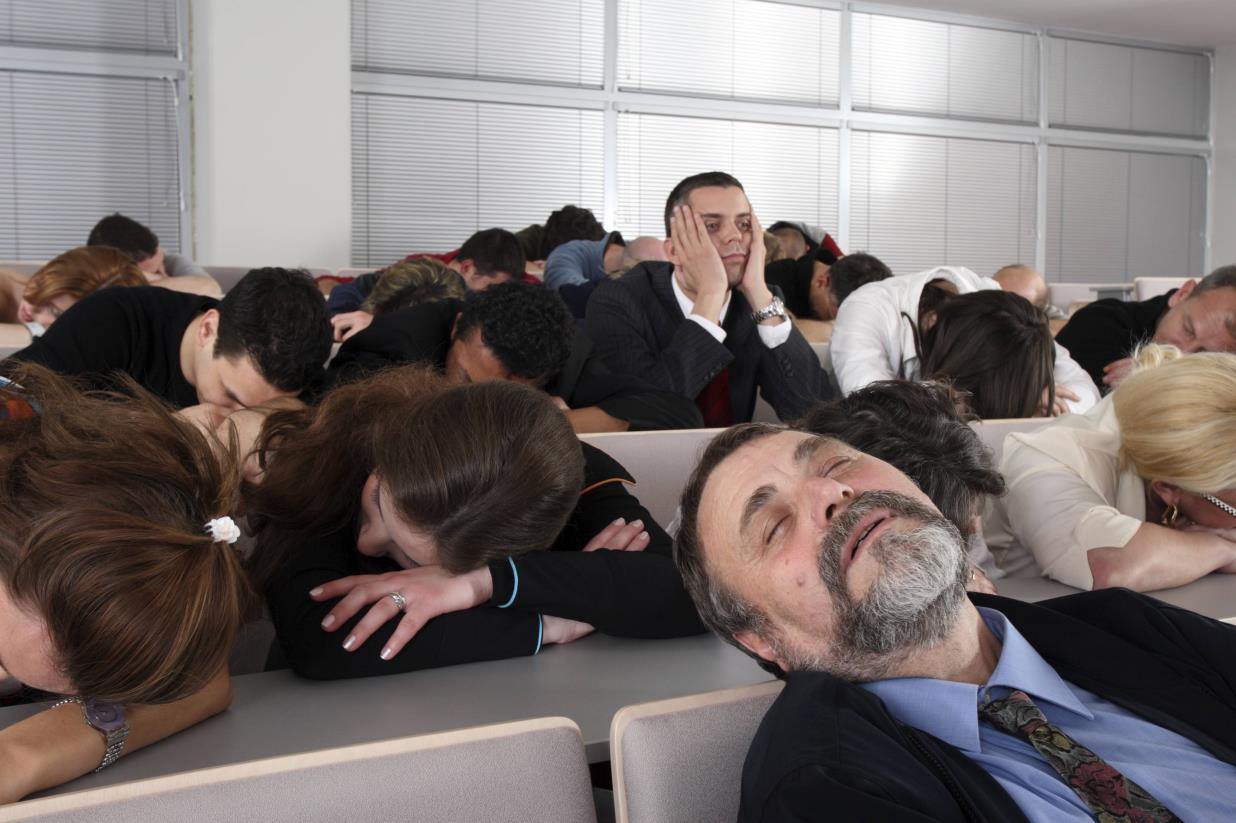
What this thesis constitutes is a master-key that has the power to unlock all the locks, and all the doors, to all the ‘mental cages’, but only if it is accepted (not just believed). This process starts by perceiving truth’s presence, acknowledging truth’s presence, accepting it for what it truly is, and then finally and most importantly, to do something with it. Understanding this information is not where this work ends: taking in this knowledge and understanding it is only the beginning. If you want to create change, action is required.
People often say, “change happens in the heart”, or, “change happens in the mind”, which is true, but lastly it happens in the guts. If you have the ‘guts’ to do something, you have developed the courage to do something. We must develop all three, heart, mind, and guts; we must care enough to know, and then finally convert that knowledge into action. Because taking action is the most important step towards creating change in the physical realm.
1. Knowledge → 2. Understanding → 3. Action
There are a few main steps to solving a problem, any problem at all. It doesn’t matter what the nature of the problem is.
For some reason, when people hear the term ‘truth’ most tend to immediately jump to incredibly mystified concepts of what truth is (to them) — starting to immediately relate the concept to God, or something else that is completely irrelevant. All this is, is mystification and obfuscation of what truth actually is.
Perception is not equal to reality or truth. For example, when a person who is visually impaired removes their glasses. Reality (truth) will remain the same, while the perception of that individual may drastically change.
Truth is objective, meaning it is not based on the perceptions of human beings. This alone can be seen as an assault on the human ego — as everybody likes to think their perceptions are important and accurate.
People’s perceptions can differ slightly from the truth, or they can differ wildly from the truth. The truth does not waver, it does not move, bend, or change: it is that which is. It doesn’t matter whether anybody believes it, knows it, sees it, nor if anybody wants to see it. It’s there, it has always been there, and it will always be there. Nobody can change what has already happened, the past can not possibly be altered — unlike the future, and the alteration of the future begins in the present moment.
All that truth is, is all that has happened in the past, and that which is happening at the present moment. That which is, and that which has been.
Whenever the term ‘truth’ is used in this thesis, that is all that is being referred to.

In the picture shown here, imagine the white lines which do not waver to be truth, and every coloured line to be the perception of an individual. Their ability to perceive what has occurred, and what is occurring, can be referred to as consciousness (a being’s ability to recognise patterns and meaning inside, and around themselves), which can be either accurate, or inaccurate.
In case of a low frequency vibration (red line), the wavelength will be longer, and the wave won’t frequently hit the white line.
In case of a high frequency vibration (blue line), the wavelength will be a lot shorter, and the wave hits the white line a lot more frequently.
The higher the frequency of a person’s consciousness is, the more their wave of perception hits the unwavering line of truth.
Solipsism is a completely egocentric and destructive ideology, that has absolutely no resemblance to truth in any way. People who are solipsists, whether they know they are or not, usually have a destructive influence on society.
The word ‘solipsism’ is derived from the Latin adjective ‘solus’ which means ‘alone / only’ and the Latin pronoun ‘ipse’ which means ‘self / myself’ — ‘only myself / the self alone’. The ideology of a solipsist is: “Nothing exists outside of me, I am the only being that exists in creation, and everything I perceive is created by me”. Or in other words, “I am God”. They believe that their perception is the only real perception, and that nobody else outside themselves truly even exists.
What this thesis teaches is that your perception isn’t always truth: you have to work to align your perceptions with the truth. Hearing this can already be damaging enough to the ego for some people. But what a solipsist believes is that you don’t even exist, and your existence is fully based on his or her perception. Therefore, in their mind, so are your perceptions.
Solipsism also happens to be the third sin of Satanism, meaning that Satanists don’t want any solipsism within their own community of followers, but they think it’s fine for others to live according to this ideology. The first sin of Satanism happens to be stupidity, which is also something that is looked down upon within their community, but considered fine for others.
In short, solipsism is the ideology that only one’s own mind is sure to exist. Solipsists contend that knowledge of anything outside one’s own mind is unsure. Therefore, to them, there is no such thing as objective truth, and nothing about the external world and its workings can actually truly be known. This state of mind only ensures a person to feel comfortable in their ignorance and laziness.
Before we look at the definition of natural law, let’s look at the definition of the word ‘definition’ — ‘an exact statement or description of the nature, scope, or meaning of a word, concept, or object / The degree of clarity of an object, image, or sound; for example, a high definition television’. To make something (de)finite, as opposed to infinite.
The more accurate our definitions for words or concepts are, the better our clarity of meaning, and therefore, our understanding of those words or concepts will be. Therefore, ‘definition’ means ‘clarity of meaning’ when applying it to words and concepts.
Since most of this thesis is going to be about natural law from here on out, we must know the definition of the concept:
Natural law is a testable hypothesis, meaning it is testable by scientific methodology: Question → Gather information → Hypothesise → Observe → Analyse and test data → Draw conclusion → Communicate your results. This works because natural law is not a religion or a belief system, but a science.
Working definition of natural law: Universal, non-man-made, binding and immutable conditions that govern the consequences of behaviour for all intelligent beings. Natural law is a set of universal spiritual laws which act as the governing dynamics of consciousness.
Natural law is capable of being discovered, understood, and harmonised with; unlike religion, which asks to believe, accept as is, and do without question. You could best try to understand the way natural law works like you understand the law of gravity, and therefore wouldn’t walk over the edge of a cliff. The law of gravity does not require your belief to be in effect, and neither does natural law.
Belief is completely irrelevant when it comes to the existence and operation of all laws of Nature, such as gravity, inertia, momentum, thermodynamics, and electromagnetism. Similar to such other phenomena of Nature, the workings of natural law don’t require belief in order to be operational, discovered, and known.
There are two ways to be fooled. One is to believe that what is not is true; the other is to refuse to accept what is true.” Søren Kierkegaard, Danish philosopher

Consciousness: The ability of a being to recognise patterns and meaning with respect to events taking place: both within oneself, and in the realm in which the being exists and operates. In other words, the ability to accurately perceive truth: that which has happened, and that which is happening at the present moment.
Expressions of Consciousness: The abilities we have, to make ourselves known to any other being around us. These expressions are:
Like in almost all major religious traditions, this represents the ‘Holy Trinity’:
The father creator (thoughts), and the sacred feminine figure (emotions), which the father figure impregnates or inseminates in some way.
From that offspring a male child is born, always. The birth of this male child symbolises that the ‘saviour’ of humanity will be action: faith alone will not be enough.
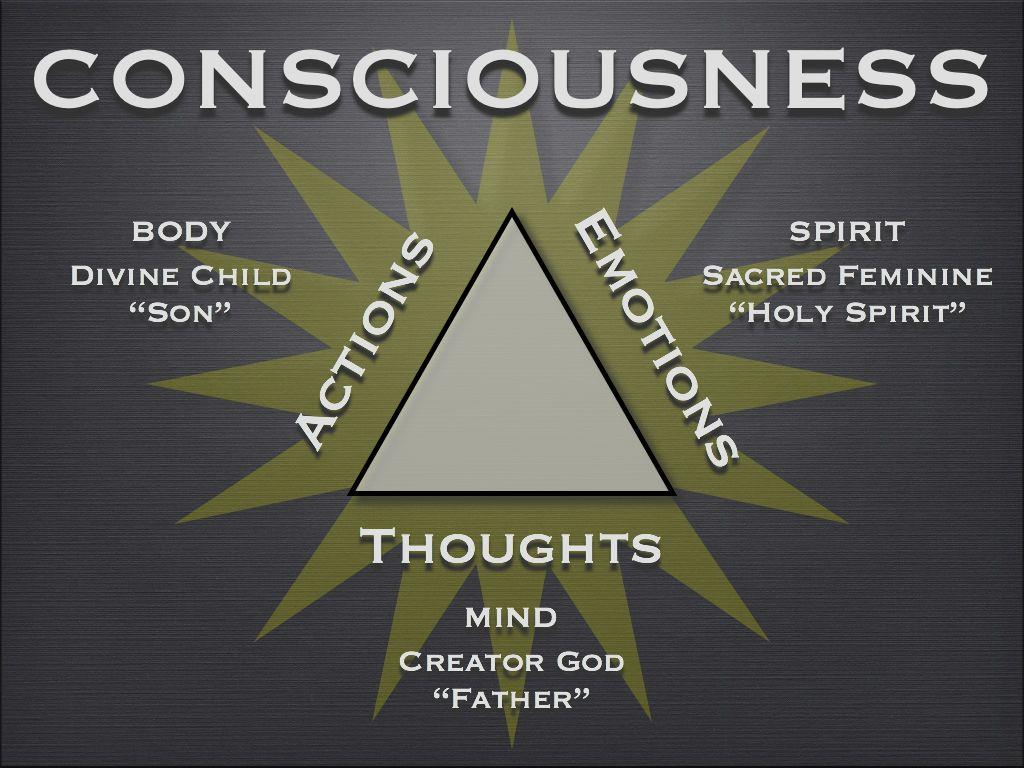
Even in modern Christianity, in their own exoteric scriptures, there is only one prescription that the Christ-figure gives to the people when asked about freedom: “You shall know the truth, and the truth shall set you free” (John 8:32).
Brain health plays a critical role in human behaviour, which is why it’s extremely important for people to become familiar with the brain’s basic structure and functions. The three main complexes that comprise the human brain are:
The R-Complex becomes active when we are in ‘fight-or-flight’ mode; when survival is at stake. This part of the brain also controls basic motor skills and respiration. It is comprised of the brainstem and the cerebellum. It is the lowest conscious part of the brain, meaning it is not a ‘thinking’ part of the brain, merely a part of the brain that reäcts to stimulus.
The Limbic system, also referred to as the ‘mid-brain’, makes it possible for us to feel in our physical realm. It does this by releasing neuropeptides into the bloodstream via different glands that comprise the limbic system, for example: the pineal gland, the thalamus, hypothalamus, pituitary gland and so forth. It is the part of our brain which makes all human emotions possible. If this particular part of the brain would not function properly, you would not be able to experience a normal range of human emotions. This is partially what psychopathy is: with psychopaths this part of the brain does not function properly. Which could be due to some form of birth disorder, or from chronic conditions in somebody’s life which have ’numbed‘ this particular part of the brain.
The Neocortex is structurally the highest part of the brain, and evolutionary the newest part of the brain. The word ‘neo’ derives from the Greek adjective ‘néos (νέος)’ which means ‘new’. It’s where all the electrochemical activity that comprise our ‘human modes of thought’ take place; that which we consider the things in thought that make us human, and separate us from the animal kingdom. By higher thought functions is meant, for example: logic, intuition, creativity and so forth. It is essentially the outer layer of the brain’s grey matter. As far as evolutionary development of the human brain goes, it is the newest part of our brain structure.

The two hemispheres of the brain are bilaterally symmetrical, meaning they are able to be divided into approximate mirrored images of each other along the midline. The two separate halves generally control different functions of the brain.
The left, intellectual part of the brain (masculine): logic, analytical thought, maths and so forth.
And the right, intuitive part of the brain (feminine): creativity, intuition, compassion and so forth.
When there is a healthy balance between the two hemispheres of the brain, that’s when real consciousness, and pattern recognition is developed. As well as true morality, and ethical consideration. Intellect is not the same as intelligence. Intellect is left brain understanding; while intelligence is holistic understanding, with the right brain included in the process.
The word ‘intelligence’ is made up of ‘intelli + gence’. The ‘intelli’ part derives from the word ‘intellect,’ and ‘gence’ comes from the Latin verb ‘gignere’ which means ‘to generate / to create / to bring forth’. So, intellect + creativity, or logic + compassion and so forth, that is real intelligence; holistic intelligence. Sadly, most people in our society are not holistically intelligent, they are usually in some form of either left- or right-brain imbalance.
If the left brain becomes chronically dominant, the R-Complex will take over executive function of the brain, and the person will become ruled by selfishness and base desires. They usually develop a personality based on domination and control.
If the right brain becomes chronically dominant, the limbic system takes over executive function of the brain, and the person will become ruled by their own emotions. They usually develop a personality based on submissiveness and naïveté.
Of course, there is a whole lot more to the workings of the human brain than is explained here; this is simply a brief explanation of its fundamental basic parts and their functions.
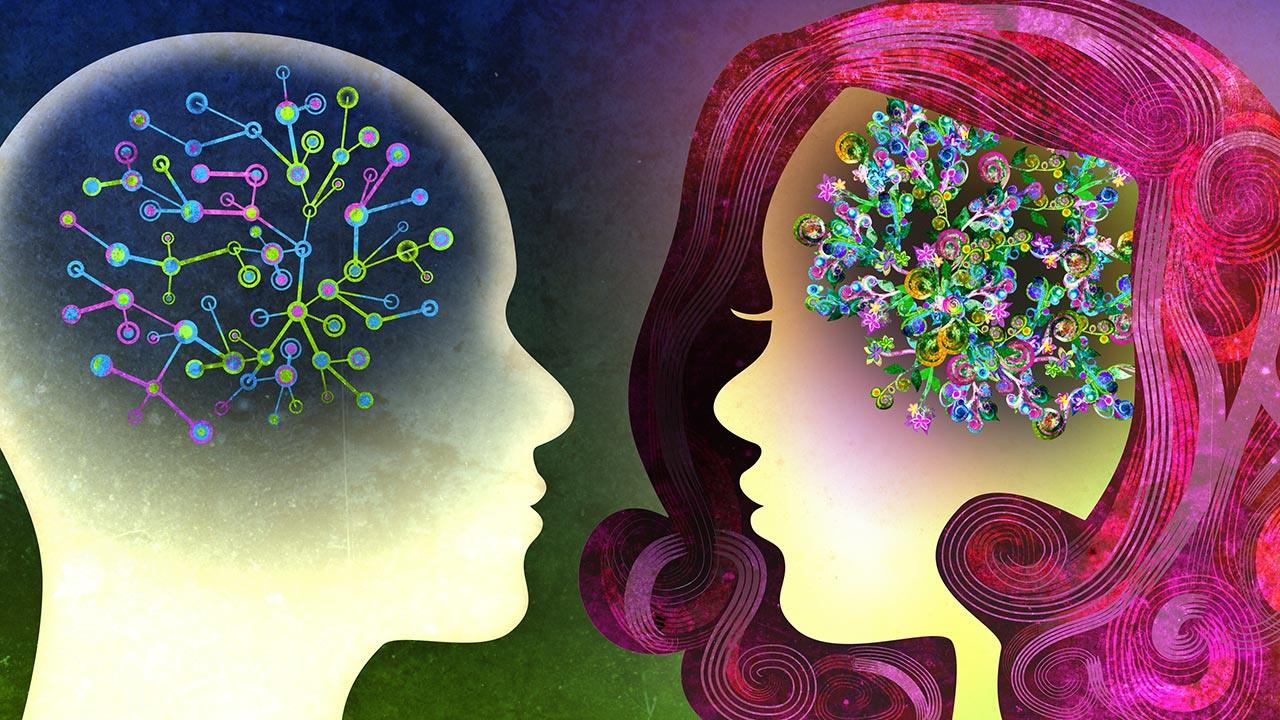
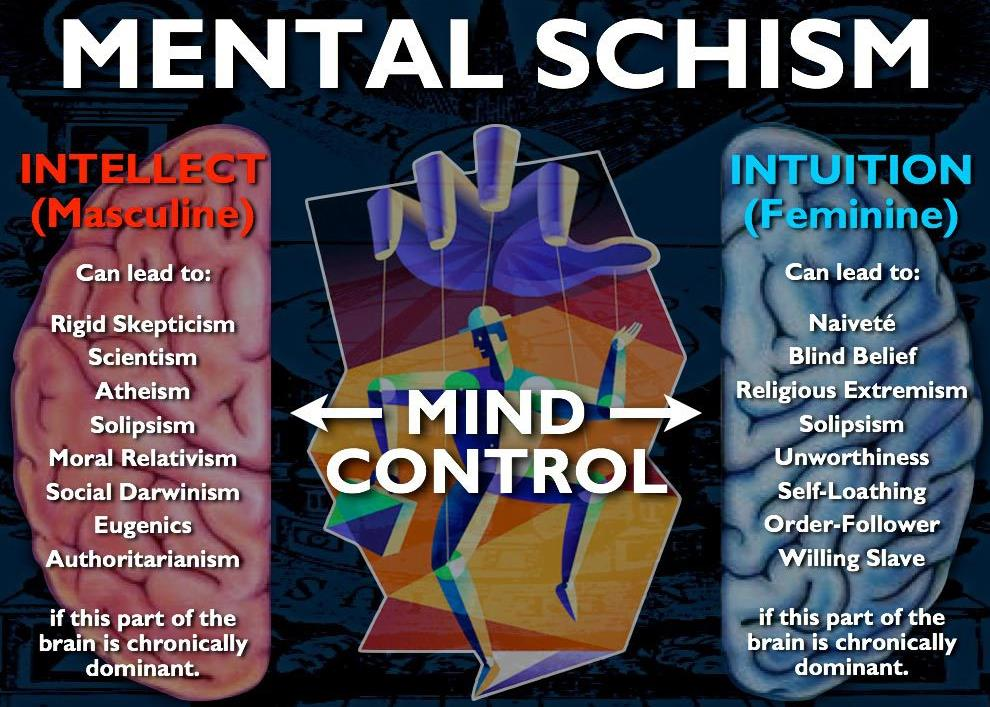
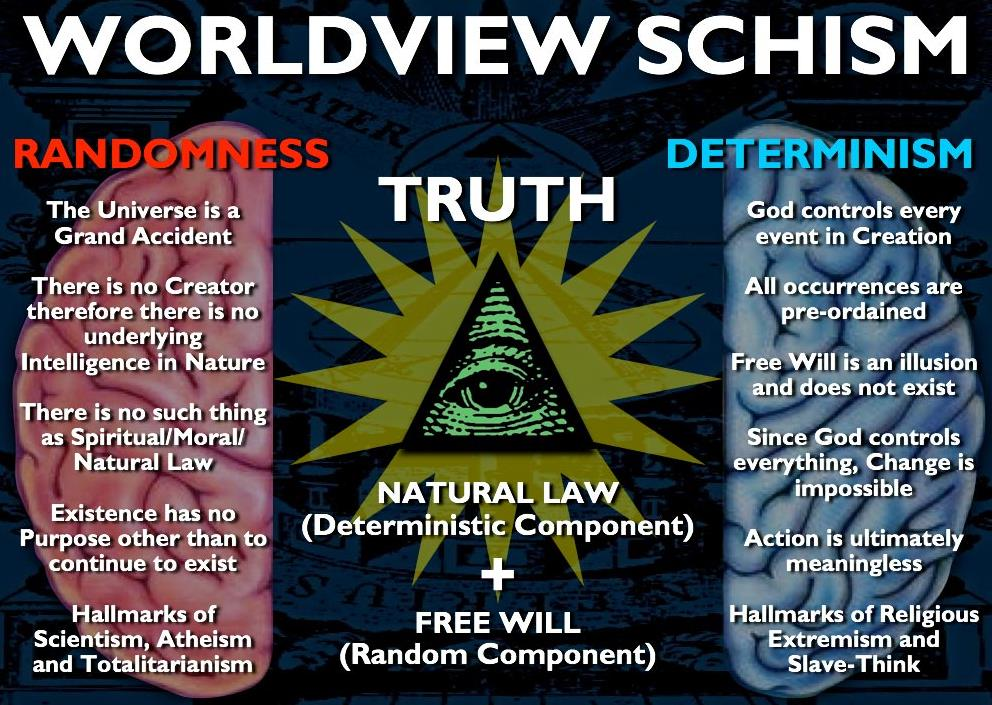
Human nature is neither inherently good nor bad. Instead, we should consider the operating conditions, and the environment in which human beings exist, that influence their behaviour to a great extent; thus, creating the current human condition.
What is the nature of a computer? — To compute information; which is nor good nor bad.
Human nature is to take in information, process it, and output in the form of behaviour. Much like a computer, human beings are programmable.
Similar to a computer, if a human being has a bad ‘file-system format’ (conditions during a child’s formative years), a bad ‘operating system’ (culture / environment), and bad ‘software programs’ (erroneous, rigid, and dogmatic beliefs), their ‘output’ (behaviour) onto the ‘screen’ (life) will also be bad. Therefore, these people will contribute to deteriorating conditions on a mass scale, for themselves, and all other beings around them.
The behaviour of any person will largely depend upon his or her programming; the quality of the information being taken in by them, which enables them to process and create efficiently.
Garbage in → Garbage out / Quality in → Quality out
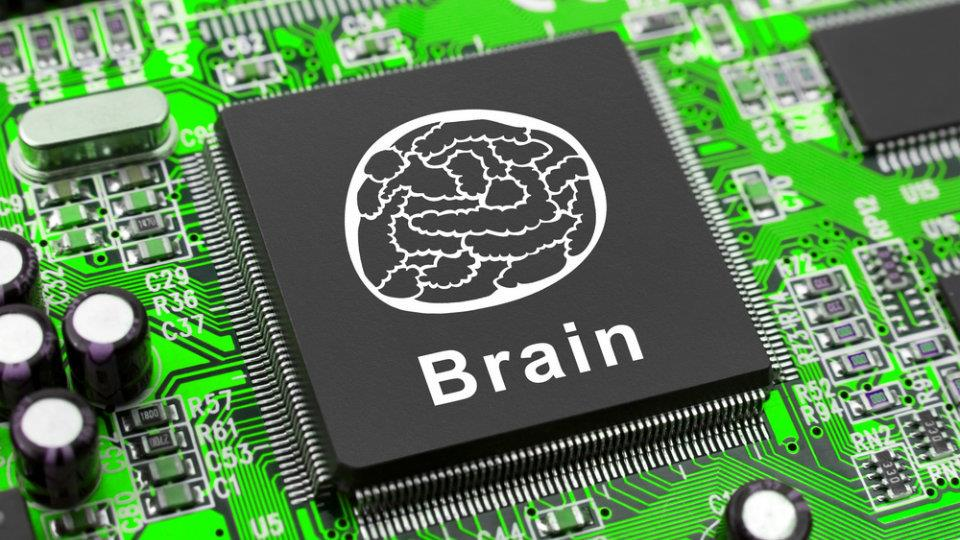
Knowledge (or lack thereof):
Available information — This constitutes potential knowledge that may be generated, processed, understood, and acted upon by individuals.
↓
Understanding (or lack thereof):
Decision-making process — These processes take place in the mind and are chosen by each individual based upon available information.
↓
Wisdom (or lack thereof):
Human behaviour — Each individual’s behaviour is based upon the quality of their decision-making processes. Which is based upon the quality of their available information.
Wisdom is not the same as knowledge or understanding. Wisdom is either action or inaction, always. It is knowledge and understanding which has been applied.
Knowledge is knowing a tomato is a fruit, wisdom is not putting it in a fruit salad.” — Miles Kington, English journalist
↓
Generated Result (order or chaos):
Manifested reality — The quality of the condition which manifests in any society is based upon the aggregate quality of human behaviour within that society.
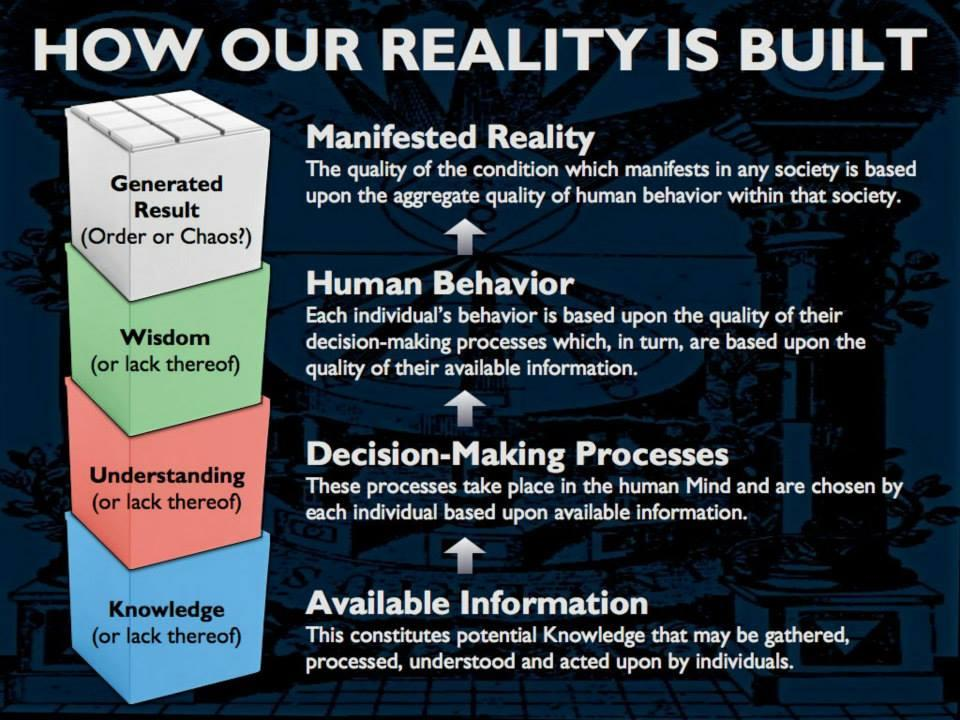
The word ‘principle’ is derived from the Latin noun ‘principia’ which means ‘first / foremost / leading / most necessary’. In other words, that which is most important. Natural law is expressed through seven basic underlying principles, plus an eighth ‘lost’ principle, which binds the other seven together. These principles constitute a ‘master key’ through which universal wisdom is unveiled.
These are the seven principles of natural law:
These are also known as the ‘Hermetic principles,’ derived from the name of the Greek God: Hermes (Ερμής), who was called the ‘Messenger of the Gods’.
Mentalism — All is mind; the universe is mental. Thoughts lead to the manifestation of all things and events in creation. Thoughts create our state of existence and the quality of our experience here on Earth. Therefore, be responsible for everything you create, by being responsible for everything you think.
Correspondence — That which is above is like to that which is below, that which is below is like to that which is above. The macrocosm (the totality) and the microcosm (the individual units of consciousness which comprise the whole) are reflections of one another. The universe is self-similar across all scales.
Vibration — Nothing rests, everything moves. At the most fundamental level, the universe and everything that comprises it, is pure vibratory energy manifesting itself in different ways. The universe has no ‘solidity’ as such; the universe is ‘holographic.’ Matter is merely energy in a state of vibration.
Polarity — Everything is dual, everything has poles. Everything has its opposite. Opposites are identical in nature, but different in degree (for example, hot and cold are seemingly opposites, while all that cold truly is, is the absence of heat energy). At some level of reality, all things that seems contradictory may be reconciled.
Rhythm — Everything flows: out and in, in and out. Everything has its tides. All things rise and fall. The pendulum swing manifests in everything. The measure of the swing to the right, is the measure of the swing to the left. Rhythm compensates.
Cause and Effect — Every cause has its effect, and every effect has its cause. Everything happens according to law. Chance is but a name for law not recognised. There are many planes of causation, but nothing escapes law. There is no free will to ignore law without consequence; that is the limit of free will. This is why natural law is also sometimes referred to as consequentialism.
Gender — Gender is in everything, everything has its masculine and feminine properties; gender manifests on all planes. While every person has a biological sex, psychologically both qualities exist simultaneously within everyone, and everything.

Care (the eighth ‘lost’ principle) — This principle encapsulates all seven other principles; if you look at the seven circles that form the seed of life, the eighth added circle forms the outer shell. Without this shell present and intact, the creative (generative) essence of the seed will be lost. Care (not compassion) is whatever you give attention to, and help to grow. This does not mean you shouldn’t care for any negative things happening in the world because you think that will feed into it and give power to it; if that happens only ignorance is being fed into it. By ignoring the negative, you are ensuring that more of it will occur. The lost principle is the dynamic of care; that which you actually care enough about to do, to spend your time on, to pay attention to, and to manifest into reality. What we care about on a day-to-day basis acts as the driving force of our thoughts and actions.
What we as conscious beings need to develop are heart, mind and guts — in that order. We must care enough to know, and then act accordingly to that understood knowledge. All three must be in place to gain unity consciousness: unifying thoughts, emotions, and actions. Therefore, care can be seen as the ultimate generator of the quality of our experience of life. Hence the eighth principle is also known as the generative principle. True care is created in our hearts, the ‘pump’ that causes our blood to flow through our body, in many ancient traditions they spoke of the ‘life force’ being in the blood. As important as the brain is, the heart is ultimately generating the experience. Because what we care about becomes what we think about, and therefore, how we behave. That which we care enough about to put our will behind is ultimately what gets created in our world. The reason the world is in the state it is in, is because most people do not care enough (even if they say they want things to be different) to change it through their behaviour.
There are two ‘spiritual currencies’: time and attention. This analogy can be seen very readily in the sayings ‘spending time’ and ‘paying attention’.
Whatever information or endeavours we put our time and attention toward, we end up getting something in return for that investment. This return could come in the form of knowledge, understanding, skills or expertise. However, this only happens if we invest our spiritual currencies wisely. We should seek to improve the quality of our attention by directing it towards information that is capable of improving both our own lives, as well as the human condition as a whole. Such an effort would constitute a valuable investment of our time.
We should more frequently ask ourselves the questions: “What am I spending my time on? What am I paying attention to?”. And most importantly, “What kind of quality am I getting in return for these investments of my spiritual currencies?”.
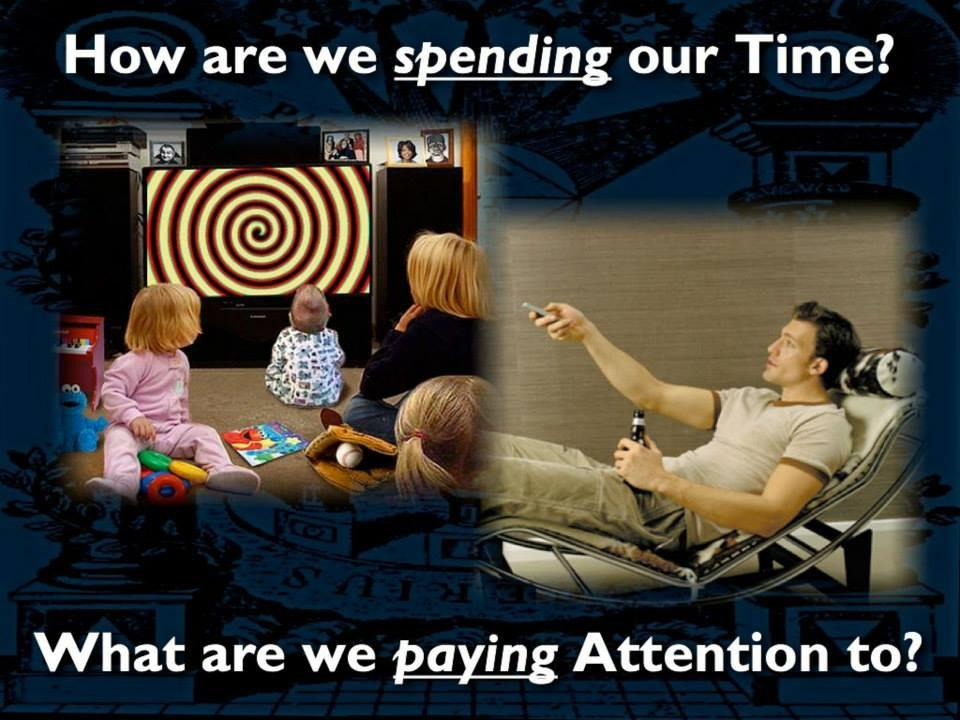
Natural Law has had many different names in many different cultures and traditions throughout the world, during different times in history. Some examples are:

These are the recognisable and observable workings of natural law that manifest through five basic expressions, which each have a positive and a negative aspect. Giving us a total of ten overall natural law expressions, which are all explained in detail on the following pages.
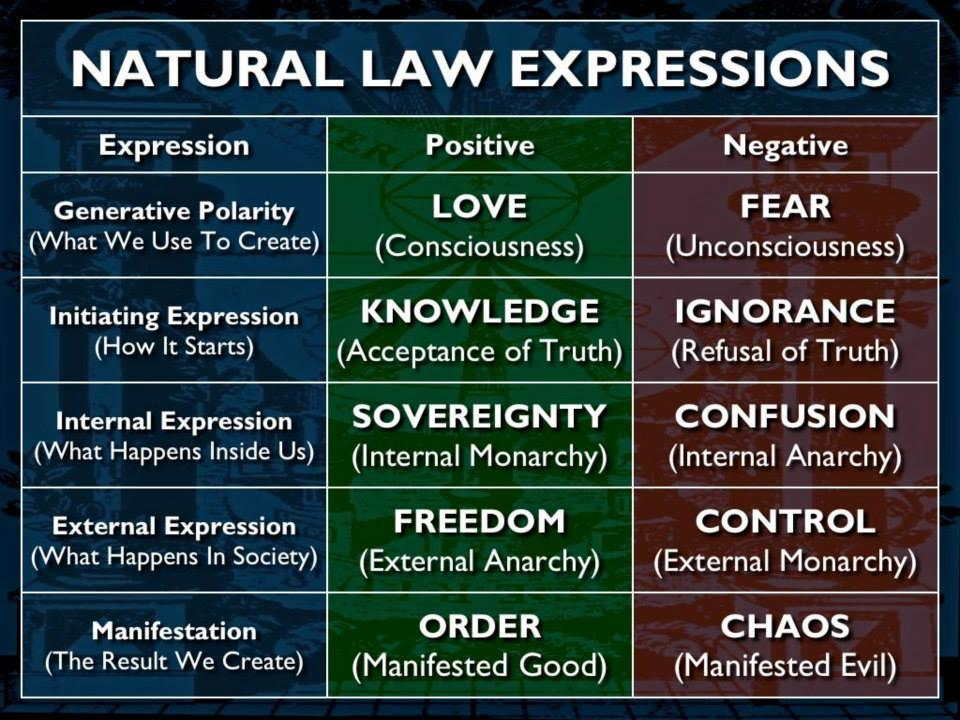
➕ The positive aspect of the Generative Polarity is ‘Love’. In regard to natural law, love should be seen as the expansive force for consciousness. Love is the force which helps us become open to truth, and expand our awareness.
➖ The negative aspect of the generative polarity is ‘Fear’. In regard to natural law, fear should be seen as the contractive force for consciousness. Fear is the force which influences us to become closed to truth, and the force which ultimately shuts down our awareness.
➕ The positive aspect of the Initiating Expression is ‘Knowledge’, or the acceptance of truth. Knowledge of truth positively influences our decision-making processes in every area of our lives.
➖ The negative aspect of the initiating expression is ‘Ignorance’, or the refusal of truth. Ignorance negatively influences the quality of our lives because it negatively influences our decision-making processes in every area of our lives. It is important to remember that ignorance should be distinguished from nescience. Nescience means not knowing something because necessary information is not present, or unattainable. Ignorance, on the other hand, means not knowing something even though necessary information is present, because that information has been wilfully refused or disregarded.
If a nation expects to be ignorant and free, in a state of civilisation, it expects what never was and never will be. Thomas Jefferson, 3rd president of the U.S.A.
“The only good is knowledge, and the only evil is ignorance. Socrates, Greek philosopher
➕ The positive aspect of the Internal Expression is ‘Sovereignty,’ or what is also referred to as ‘Internal Monarchy’ (one ruler within). The word monarchy is made up of the prefix ‘mon-’ derived from the Greek adverb ‘mons (μόνα)’ which means ‘one / single / alone’ and the Greek noun ‘archon (αρχων)’ which means ‘master / lord / ruler’. Therefore, monarchy means ‘one ruler.’ As a state of consciousness, sovereignty means that one has unified the three aspects of their consciousness, in the way that there is no contradiction between one’s thoughts, emotions, and actions. The word ‘sovereign’ is derived from the Latin adverb ‘super’ which means ‘above / beyond’ (In classical Latin the ‘v’ character represented a ‘u’, hence the letter ‘w’ is called a ‘double u’. The ‘v-sound’ didn’t phonetically exist in classical Latin, instead the ‘v’ was represented by the letters ‘p’ or ‘b’). The second half stems from the word ‘regnum’ which means ‘reign / rulership / (externally imposed) control / kingship’. Thus, the word ‘sovereign’ means: ‘one who is above the rulership or control of another’. Therefore, the word sovereign means ‘not a slave’. Being sovereign means being a monarch (mon-: ‘one’ / archon: ‘ruler’), a single ruler who rules only the ‘kingdom of self’. Sovereignty is a state of being in which one controls one’s own thoughts, emotions and actions, and by bringing them into unity / non-contradiction / non-duality, attains mastery of one’s own consciousness.
Self-Control = Self-Mastery = Self-Ownership
➖The negative aspect of the internal expression is ‘confusion’, or what is also referred to as ‘internal anarchy’ (no ruler within). Confusion is the state of mind in which the being is ruled by fear and ignorance. Confusion can be seen as internal opposition, in such a way that one’s thoughts, emotions, and actions are in perpetual contradiction with one another; the three are not in alignment. As we think is not how we truly feel, and is not how we act. There is complete contradiction and separation internally, when there is no unity amongst these three aspects of our consciousness.
➕The positive aspect of the External Expression is ‘Freedom,’ or what is also referred to as ‘external anarchy’ (no external ruler). True freedom for all beings should be seen as the ultimate goal of spiritual development. And such a state can only manifest as a result of human society’s adherence to natural law.
➖ The negative aspect of the external expression is ‘control’, or what is referred to as ‘external monarchy’ (one external ruler). For example, the concentration of illusory power by a king, or by institutions like government. Externally imposed control is the pathway to all forms of evil and destruction. It results when a society lives in direct opposition to natural law.
➕ The positive Manifestation is ‘Order’, or manifested good. Order represents everything we truly want to manifest. Order results only when there is balance and justice; which can only be present when truth has been accepted, and our behaviour has been brought into harmony with natural law.
➖ The negative manifestation is ‘Chaos’, or manifested evil. Chaos is the exact opposite of what we truly want to manifest. Chaos occurs when there is imbalance and injustice; which results whenever there is ignorance of truth, and behaviour which is in opposition to natural law.
All five expressions of natural law are unilateral, meaning they do not cross over into one another. Therefore, there is no way you could accept truth and develop knowledge, and then end up in a state of confusion. Just as you cannot go from ignorance to sovereignty. The natural law expressions simply don’t work that way.
If you keep waiting on an external saviour, you are going to be waiting in your chains forever. Even the modern Christ-figure himself proclaimed that the knowledge of truth would be the only pathway to true freedom. Until you take in the light, you will never dispel the darkness. The light being knowledge of truth; which is what ‘light’ has always symbolised and represented in the bible, and in numerous other ancient mystery traditions.
The light shines in the darkness, and the darkness can never extinguish it. — John 1:5
The concepts ‘Right’ and ‘Wrong’ are diametric opposites of one another. Right and wrong do not merely exist as concepts in the human mind, anybody who believes that is engaged in Satanism, whether they are aware of it or not. Explained in a way that’s completely unambiguous; if you believe that there is no real difference between right and wrong, and that this concept isn’t inherent in Nature, you are accepting a Satanic belief.
This is because the second tenet of Satanism is the concept of moral relativism (left brain imbalance). There are four main tenets — also referred to as the ‘pillars’ — of Satanism:
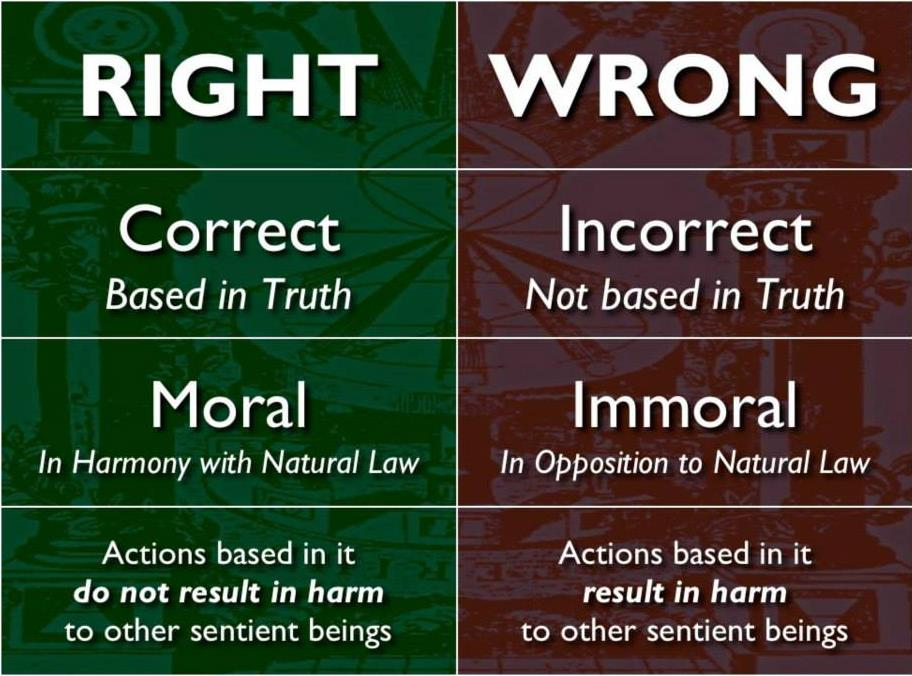
Morality is not about right versus left, it’s about right versus wrong. A deep understanding of morality, and the principles concerning the distinction between right and wrong behaviour, lies at the very heart of natural law.
Just as in ancient Rome the word ‘liber’ meant ‘book’ (library) and ‘free’ (liberty) simultaneously, the word ‘right’ means ‘correct’ and ‘moral’ simultaneously, as does ‘wrong’ mean ‘incorrect’ and ‘immoral’ simultaneously. So, in the sense of what you ‘have a right to do’, what is a right? — Any action in which you are correct and moral in doing so. Every single person has the same rights as the next; not one person has any more rights than another, nor any less rights, at any place, at any time.
Rights are most easily understood when they are considered through ‘apophatic inquiry’. This process helps us to understand what a right actually is, by understanding which actions are not rights because they cause harm to other sentient beings.
The word ‘apophasis’ is derived from the Greek noun ‘apophanai (απόφασις)’ which means ‘to speak off’. This is a method of logical, deductive reasoning, that is employed when given a limited set of possibilities, in which we gain knowledge about something by excluding the known negatives, or by setting the logical inconsistencies to the side. In other words, describing what something is, by explaining what it is not.
Harmful Actions:
Although this is already a short and seemingly simple list, all these transgressions can ultimately be narrowed down to just one wrong-doing: Theft.
Every harmful action that a person is capable of taking is a form of theft; some form of property is always being stolen when a wrong-doing is committed.
A living being or their property must have been harmed or damaged in order for a violation of natural law, or a wrong-doing to have taken place. Any action which does not cause such harm to other sentient beings is a right: No victim, no crime. This is the fundamental crux of natural law; what is right behaviour, and what is wrong behaviour. There is no such thing as the delegation of a wrong-doing. In other words, if a specific action is not a right for any individual, then that action cannot be ‘delegated’, ‘granted’, or ‘licensed’ to any other individual, or group of individuals, and suddenly be called a right. That action forever remains wrong under natural law.
Rights can’t be granted to human beings by other human beings, because rights don’t come from human beings; everybody is born with the exact same rights. Natural law (the difference between right and wrong behaviour) always holds true regardless of a population’s belief systems (culture). This means that it doesn’t matter how many people agree that a wrong action can be turned into a right action, or that a right action can be turned into a wrong action. Such things can never be done in reality. People can only believe they can claim such reversals and that this will in some way make it so. Unfortunately, at this moment in time most people do erroneously believe that it is morally possible for some groups of people to create and delegate ‘rights’ which do not exist, or to take away rights which do exist.
When in doubt as to whether an action is, or is not in harmony with natural law, visualise the scenario of a world with only two people. If the behaviour is a right or a wrong in that instance, it shall forever remain a right or a wrong in any size population; regardless of how many people may believe otherwise. So, if the action is a right for one person to do toward another, it shall always remain a right. And if the action is a wrong for one person to do toward another, it shall always remain a wrong, regardless of the number of people involved.
For example, let’s examine Taxation for what is really is, without euphemising. Taxation is the claim that a group of people who call themselves ‘government’ have been given or delegated the ‘right’ to (forcibly) confiscate an arbitrarily chosen percentage of the product of another individual’s labour (a form of property), whether or not that person agrees to share that product voluntarily (coërcion is involved). Taxation is enforced by the threat of theft (seizing property that is rightfully a person’s possession), the threat of imprisonment (taking away the physical freedom of movement), or even the threat of violence (behaviour resulting in bodily harm) if those from whom the product is being seized attempt to resist the confiscation. This practise is always ‘justified’ by those who claim that such practises are necessary and required to uphold the common good.
The word ‘justified’ etymologically derives from the Latin nouns ‘jus / juris’ which mean ‘right / law’, and the Latin verb ‘facere’ which means ‘to create / to make’. Therefore, ‘to justify’ etymologically means ‘to create right / to create law’.
If we define the concept of slavery as: the involuntary confiscation of one hundred percent of the product of labour of another person, we can clearly see that there is no percentage to which we could lower this number (other than zero percent) that would no longer constitute slavery. Many people try to justify this by saying this money is used for different services. However, we aren’t able to refuse most of these ‘services’.
Imagine, you have a computer at home; one day a computer technician knocks on your door and tells you: “I am now your computer technician, and you are not allowed to refuse my services”. Immediately the right to choose (free will) has been taken away. Then he tells you “Whether you want or don’t want my technician services, I’m going to need three hundred dollars. Every year, I’ll come over every two months to collect my money. I do not care if you are happy with my service or not, and if you refuse to pay me, I will take your computer”. Does it seem like the computer is truly yours, if you are living under that kind of coërcion? Or does it seem more like a violent criminal telling you, “I am going to steal your possessions if you don’t give me what I tell you to”. That sounds more like a form of extortion or duress, and that is what all forms of taxation fall under; duress.
If we are being completely honest with ourselves, taxation is merely a euphemism for theft, violence, and slavery; these are the three practises on which it is actually truly based. Since no individual anywhere on Earth has the right to claim ownership of the product of another person’s labour, such behaviour can never be delegated to a group of people, and called a ‘right’. Therefore, all forms of taxation are always wrong according to natural law.
Another important example of something to examine for what it actually truly is, is Prohibition. Whether regarding drugs or junk-food, ingesting anything harmful into the body is strongly opposed, hopefully for obvious reasons; purification of the body is an important part of purification of the mind. It is crucial to recognise that anyone should be allowed to put anything inside their body, because they own their body. If an individual, for whatever reason, wants to ingest any given substance they always have the right to do so; because their body is their property.
People easily tend to overthink the concept when confronted with the question whether their body is theirs or not. They often pause and ask themselves questions like, “Am I going to own my body forever? I’m going to die someday, does that mean I don’t own it now?”. This is a complete over-mystification of the concept. All sensible people recognise that they will die someday, and that their consciousness will then leave their bodies. Does that mean they don’t own their body right now? Your consciousness inhabits (lives / exists inside) your body, which is one of the specific reasons you own your body, the other is that you are using your body right now. Specifically, because your consciousness inhabits your body, and you are using it as the vehicle for the expression of your consciousness; your body is yours.
Continuing on the topic of prohibition, it is the claim that a group of people who call themselves ‘government’ have been given the ‘right’ to prevent others from putting any given substance into their own bodies, and if those people refuse to comply with those terms, they will be fined or imprisoned. It should be self-evident that since an individual’s body is their own property, that individual always maintains the natural right to decide what will or will not be put into their own property. In this instance, their own body.
Imagine another person telling you that you aren’t allowed to put your jacket into your car, or that you can’t put a certain piece of furniture inside your home. Why is it that most people would not accept that, but do accept this concept regarding their own body? Because people can’t seem to separate the act of imbibing the substance, and the action that someone may subsequently take, which are two different things. A person may have some drinks, and get drunk if they wish to; but if that person goes out on the street afterwards and starts beating somebody up for no reason, they obviously have no right to do that. However, an individual maintains the right to go drinking, or use cocaine, or even inject heroine into their arm. They obviously aren’t good ideas, but every individual has the right to do so if they please; as long as their subsequent behaviour isn’t immoral and wrong. And if it is, they are still fully accountable for the actions they took, that’s what personal responsibility is. The two separate acts of a person having the right to put whatever they want into their own body, and still being personally responsible for whatever he or she may do with their body afterwards, need to be clearly delineated, and separated from one another.
Understanding this, we can easily see that the claim of ‘right’ to dictate what will or will not be put into the body of another person amounts to a claim of ownership upon the other person’s body. Imagine somebody telling you that you aren’t allowed to eat carrots or drink orange juice for example. The claim of ownership upon another person’s body is slavery. Therefore, prohibition is merely a euphemism for slavery, backed by violence, regardless of the justifications made by those who claim such practises are necessary to uphold the common good. Since no individual anywhere on Earth has the right to claim the ownership of another person’s body, such behaviour can never be delegated to a group, and called a right. Therefore, all forms of prohibition are always wrong according to natural law.
Lastly, we will examine Licences and Permits, keep in mind to also visualise the same scenario with only two people as was mentioned before. In that sense, most people can readily see that no single person, or group of people is able to legitimately make these claims towards another person; regarding taxation, prohibition, licenses and permits. We have gotten to the point where most people actually believe that certain groups of people have created rights for themselves that other people don’t have. Licences and permits are claims that a group of people who call themselves ‘government’ have been given the ‘right’ to prevent other people from exercising specific behaviours, even if such behaviours cause no harm to others, or their property. Unless those people petition (definition of petition: a formally drawn request, that is addressed to a person or group of persons in authority or power, soliciting some favour, right, mercy, or other benefit), or pay the government for permission (where the word ‘permit’ is derived from) to be allowed to exercise those behaviours. This amounts to the claim that rights are merely privileges that may be granted or taken away by government at any time, based upon the people in government’s preference or discretion. Remembering that the definition of a right is: any action which does not cause harm to another sentient being or their property. It can be readily seen that there is no such thing as the ‘right’ to stop someone from exercising a right, since rights cause no harm. The claim over the rights of another person is called slavery, regardless of the justification made by those who claim such practises are necessary to uphold the common good. Since no individual anywhere on Earth has the right to claim the ownership of another person’s rights, such behaviour can never be delegated to a group, and called a right. Therefore, all forms of licensing and permits are always wrong according to natural law.
Force and violence are often spoken about as if they are one and the same, and used interchangeably. While in fact, they are actually diametrically opposed, polar opposites.
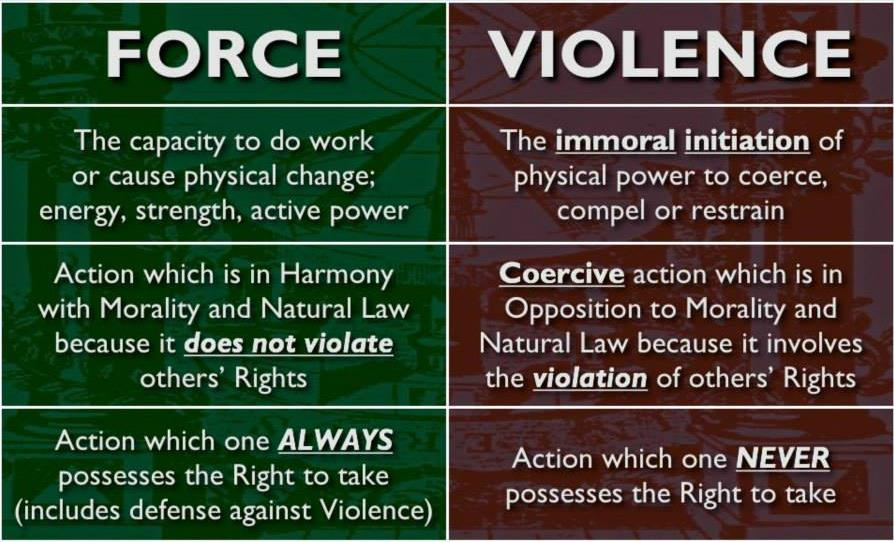
The capacity to do work or cause physical change. — For any change to be created in the physical world in any capacity, physical force must be applied. There is nothing you can do to change something in the physical world, that doesn’t require force. The words you are reading right now were typed out by hand using physical force. Force is the capacity to perform physical work; physical change.
Actions are in harmony with morality and natural law because they do not violate others’ rights. — As soon as a person steps over that line, and uses initiation of force for coërcive reasons or applications, that is what makes it violence instead of force. Force itself is not the same as violence.
Action which one always possesses the right to take (includes defence against violence). — When you are approached with violence you reserve the right to use physical force defensively against such an assault.
The immoral initiation of physical power to coërce, compel or restrain. — Initiation is the key word here (definition of ‘initiate’: to begin / to introduce / to start). Nobody ever has the right to enact violence; because violence is always starting the conflict. In short, the immoral initiation of force is violence.
What often happens in primary schools when two students get into a physical altercation, the teachers usually tend to say: “It doesn’t matter who started it”, but that is one of the most critically important things. Because the person that struck first, is the person that conducted violence, they initiated the immoral use of physical force.
Coërcive action which is in opposition to morality and natural law because it involves the violation of others’ rights. — This is exactly why it’s called violence: it violates the rights of other people. The act of violating rights is what violence is, it’s derived from the same root word, the Latin verb ‘violare’, which means ‘to treat with violence or dishonour’.
Action which one never possesses the right to take. — There exists no such thing as the right to commit violence. However, one always reserves the right to use force in a defensive capacity, up to, and including deadly force.
The first pillar of enlightenment is the ‘sacred feminine’ principle, also called the ‘non-aggression’ principle. This principle states: do not engage in violence. In other words, do not immorally initiate non-rightful use of physical force to coërce, constrain, or compel the rightful behaviour, or free will choice of another sentient being.
The second pillar of enlightenment is the ‘sacred masculine’ principle, also called the ‘self-defence’ principle. This principle states: sentient beings have the inherent right to use force to defend themselves and others from violence conducted against them.
There is no such thing as an enlightened being that doesn’t fully grasp both of these principles.

The main reason our species continues to experience a systematic and growing loss of freedom is because we collectively do not deeply understand ownership, and we continue to commit and condone theft.
To own something means that, regarding that thing, an individual maintains:
Natural law can essentially be reduced to a single spiritual law: don’t steal. That’s all. We have to collectively understand that all rights are property rights. Stop taking the property of other beings, and stop condoning the taking of property of other beings.
Most people don’t seem to think of conscience as knowledge, while that is exactly what it truly is. It isn’t behaviour, it isn’t action; it’s knowledge. The word ‘conscience’ is derived from the Latin prefix ‘con-’ which means ‘together / with’ and the Latin verb ‘scire’ which means ‘to know / to understand’. Those two words combined mean ‘to know together.’ Therefore, conscience is common sense, quite literally. All of us together must come to an understanding of the definitive knowledge of the objective difference between right and wrong behaviour according to natural law.
The exercise of conscience is the free will choice of right action over wrong action; once the definitive knowledge of the objective difference between right and wrong according to natural law has been acquired and integrated into the being. We must acquire that knowledge first, come to an understanding of it, and finally we act either in accordance with it, or in disharmony with it. If we act in accordance with it, that is called the exercise of conscience.
The law of freedom states: freedom and morality are directly proportional.
As morality increases, freedom increases.
As morality declines, freedom declines.
Another way of stating this law would be to say that the presence of truth and morality in the lives of people in any given society, is inversely proportional to the presence of tyranny and slavery in that society. The more knowledge of truth and morality there is, the less tyranny and slavery there will be within that society.
True freedom can never exist in a society that embraces moral relativism, the idea that there is no inherent and objective difference between right and wrong, thinking that humanity may arbitrarily ‘create’ or ‘decide’ right and wrong for themselves.
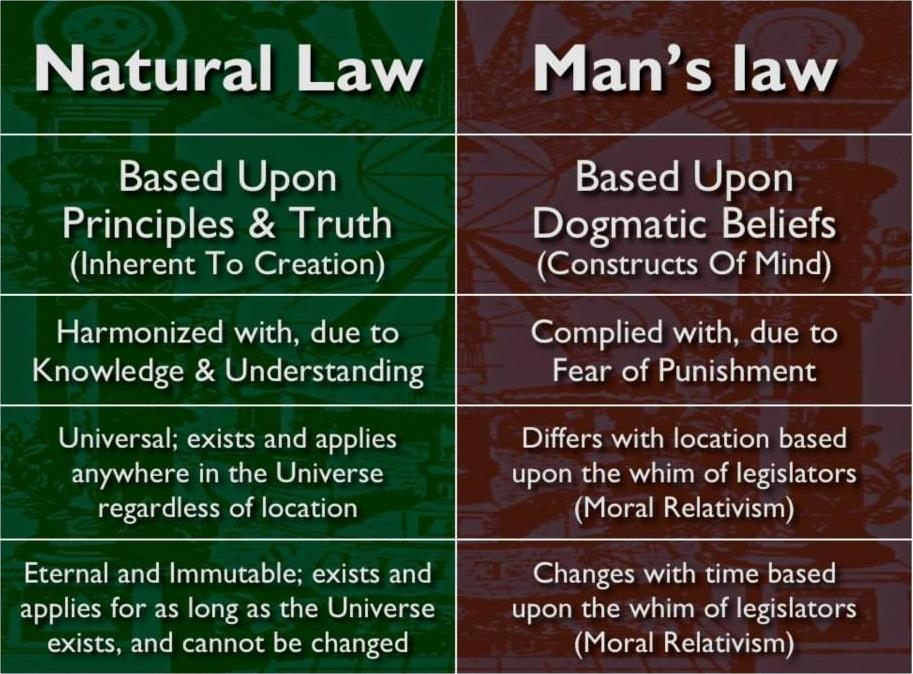
Based upon principles and truth. (Inherent to creation). — Things that are inherent to creation are not made or caused by humankind.
Harmonised with, due to knowledge and understanding. (or rejected, due to ignorance or contradicting beliefs). — Natural law isn’t something that’s based on a person’s compliance, because that person has to fear the ‘punishment’ of not understanding it. If you don’t understand it, and don’t live according to it, the result or consequence will be inescapable. If you behave a certain way, there are certain consequences. And if you change your behaviour, you’ll change the consequential results.
Universal; exists and applies anywhere in the universe regardless of location. — There is no place you can go in the physical universe where natural law doesn’t apply.
Eternal and immutable; exists and applies for as long as the universe exists, and cannot be changed. — Natural law is immutable because it cannot be changed by any action that any being in the universe is capable of taking.
Based upon dogmatic beliefs. (Constructs of mind). — These beliefs can be seen as ‘programs’ operating in the human mind.
Complied with due to fear of punishment. — Fear is usually the only reason people ever comply with the law of man; and fear is an extremely low state of consciousness.
Differs with location based upon the whim of legislators. (Moral relativism). — For example, prohibition: you are ‘allowed’ to smoke marijuana in certain countries, but could be jailed for doing the exact same thing in another country where it’s deemed ‘illegal’.
Changes with time based upon the whim of legislators. (Moral relativism). — To use prohibition as an example again; from 1920 until 1933, it was made illegal to possess, and to consume alcohol in the United States of America. Before 1920 it was legal, and after 1933 it was made legal again, all because of what some politicians wrote on pieces of paper.
For man’s law this means; if a particular man-made law is in harmony with natural law, then it follows logically that it is redundant, since it is stating a truth that is preëxisting and inherent in nature. Therefore, the writing down of that concept and calling it a law, is both unnecessary and irrelevant.
If a particular man-made law is in opposition to natural law, then it follows logically that it is both false (incorrect) and immoral (harmful to others), more simply put, it’s wrong. Because if it isn’t based in natural law it means that it is causing somebody harm by taking something that belongs to them, whether it’s a right, or any physical possession. Therefore, it can never be legitimately binding upon anyone. Somebody can’t write down a wrong-doing and tell you that it is morally binding upon you, while simultaneously literally stating that even though it causes harm, you must obey this rule. In light of natural law, man’s ‘law’ is always unnecessary and irrelevant.
Everyone has the exact same rights. Nobody has any more or any less rights than anyone else. Since rights are not created by humanity, and since they are the birth-right of humanity, gifted to us by the Creator of the universe. Not a single person or group of people is capable of ‘granting’ or ‘gifting’ rights to anyone else, nor is any person capable of revoking rights from anyone else.
Government is nothing but men acting in concert. The morality and value of government, like any other association of men, will be no greater and no less than the morality and value of the men comprising it. Since government is nothing but men, its inherent authority to act is in no way greater or different than the authority to act of individuals in isolation. Government has no ‘magic powers’ or ‘authority’ not possessed by private individuals. Let he who asserts that government may do that which the individual may not assume the onus of proof and demonstrate his contention. — Chris Lyspooner, Ludwig von Mises Institute
The word ‘government’ is derived from the Latin verb ‘gubernare’ which means ‘to control / to rule / to direct’ (just as was shown earlier with the etymological breakdown of the word ‘sovereign’, there is no ‘v’ in classical Latin. This can be readily seen in the name of the ceremony for electing a governor; they are called ‘gubernatorial’ elections). The second part of the word ‘government’ is derived from the Latin noun ‘mens’ which means ‘mind’. Therefore, put together the word ‘govern-ment’ etymologically means ‘mind control’.
The etymological origin of the English suffix ‘-ment’ is often debated, yet it is quite clear that those who created the English language deliberately chose ‘mens’ the Latin word for ‘mind’, to mean ‘the state of’ or ‘the Condition of’, in direct keeping with the first Hermetic principle; the principle of mentalism. Which demonstrates that in order for any particular event, circumstance, state or condition to exist in our current manifested reality (the plane of effects), it must first have existed in the mind (the plane of causality).
Government is based on the illusory concept called ‘authority’. People that believe certain other people are authorities, means they believe that those individuals have rights that other people do not. Mainly, the rights to command, compel, coërce and constrain.
Authority is based upon an equally illusory concept called ‘jurisdiction’. The word ‘jurisdiction’ is derived from the Latin noun ‘jus / juris’ which means ‘right / law’, and the Latin verb ‘dictere’ which means ‘to speak / to say’. Thus, the word ‘jurisdiction’ literally means ‘to say what the law is’. In other words, to ‘make up’ or to ‘decide’ what the law is.
‘Authority’ is an illusion of a diseased psyche, based entirely in violence and built upon the false belief that some people are ‘masters’ who have the moral right to issue commands, and that other people have a moral obligation to obey those commands. Simply put: slavery.
The belief in the legitimacy of ‘authority’ is the belief in the legitimacy of slavery.
Ultimately, ‘authority’ is the idea that man can become God, and through jurisdiction, dictate the law, and dictate what is right and wrong.
The concept of government and the concept of authority are forms of (false) religion, yet most people fail to see it that way. The word ‘religion’ is derived from the Latin verb ‘religare’ which means ‘to tie back / to hold back / to thwart from forward progress / to bind’. A false religion is a system of control based in unchallenged, dogmatic belief which holds back the progress of consciousness.
We should stop trying to make our religion truth, and start making truth our religion.
There is only one true divide that separates humanity into two distinct types of individuals. The criterion for this divide is whether or not a person believes in ‘authority’, and therefore believes that there is legitimacy to slavery. That is the only divide which truly separates us.

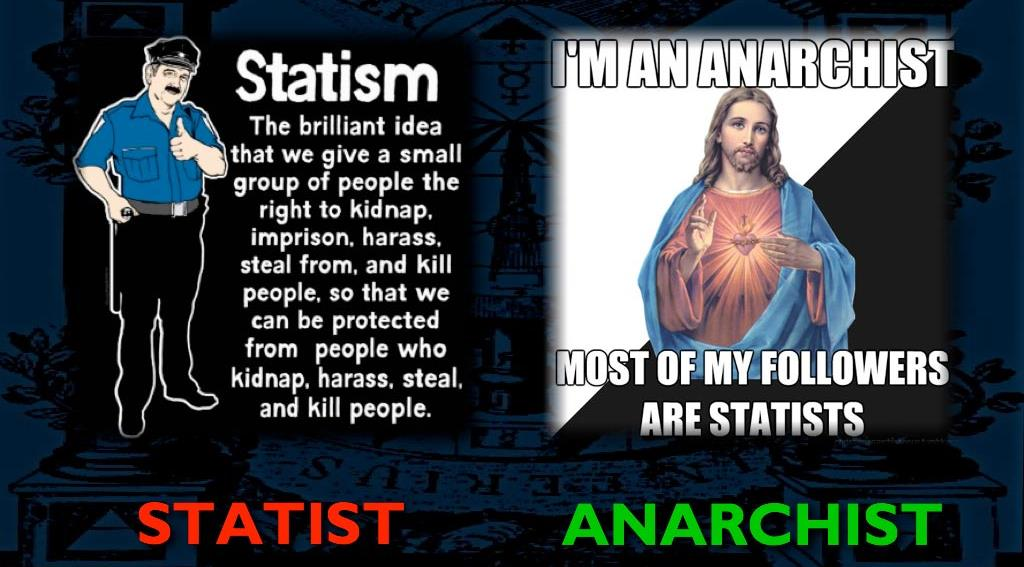
A Statist is a person who erroneously believes that there is such a thing as ‘authority’ vested in certain people, giving them the ‘right’ to rule over others. This ‘authority’ means that certain people, who call themselves ‘government’, have the moral right to issue commands to those whom they rule (those under their jurisdiction), and that their subjects (slaves) have a ‘moral obligation’ to obey the arbitrary dictates (laws) set by their ‘masters’. Most simply put, a statist is someone who believes in the legitimacy of slavery.
Conversely, an Anarchist is a person that knows there could never be legitimacy to ‘authority’ or ‘government’ because those terms are simply euphemisms for violence and slavery, which are always immoral and in opposition to natural law.
The word ‘anarchy’ is derived from the Greek prefix ‘an- (αν-)’ which means ‘without / the absence of’ and the Greek noun ‘archon (αρχων)’ which means ‘master / ruler’. Anarchy does not mean ‘without rules’ — it literally means ‘without rulers / without masters’. The only permanent rules that are in place, are the ones of natural law.
No Masters = No Slaves
It seems self-evident that anarchy is the true meaning of freedom, and yet, when you ask a person what anarchy means (to them), and what they associate it with, the answer will most likely be: rioting, looting and destroying other people’s property, in one word: chaos. Which is literally the exact opposite of what anarchy truly is.
Chaos shouldn’t be viewed as something to be feared, it should rather be viewed as a teacher. Definitely a harsh teacher, but a teacher nonetheless. It teaches us through the apophatic process, what not to do.
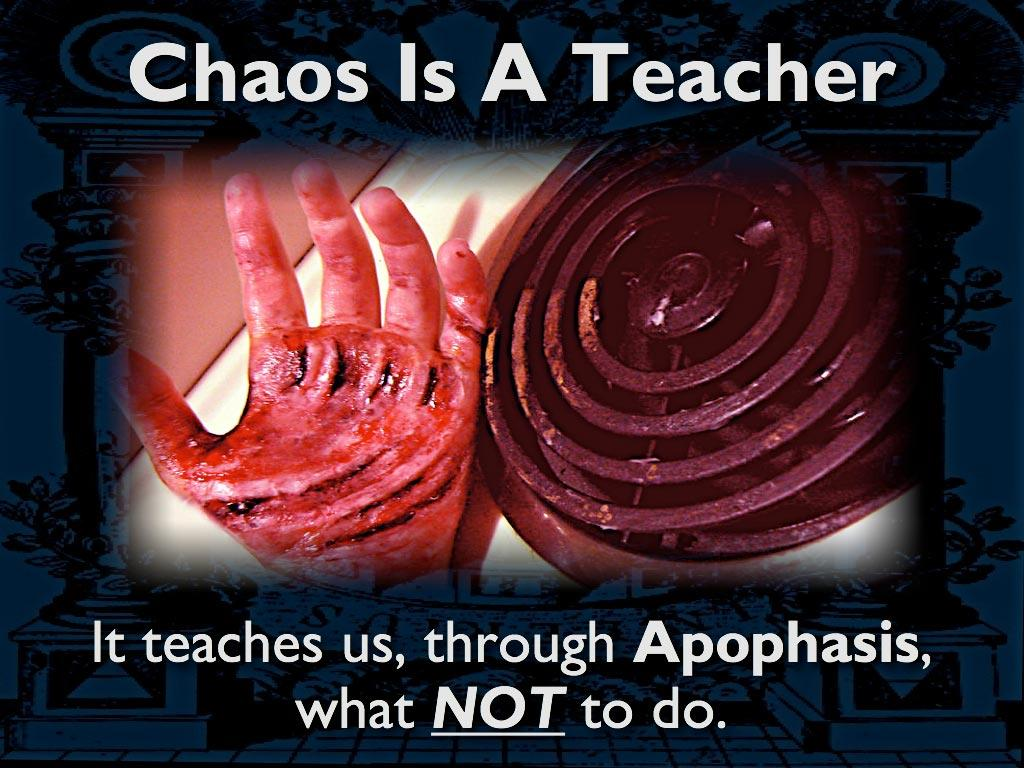
What you see pictured above is obviously a bad idea and you probably shouldn’t do that; if your desire is not to burn your hand up to the point of blistering and your skin coming off. But if you don’t care about that happening, then by all means, keep your hand right on that burner. However, if you wish not to get burned, there are certain requirements for obtaining that condition. That means you can’t keep your hand on something that is extremely hot, or natural law will take over and burn your hand. In our current human condition it seems that a lot of people would say they do not want to be burned, yet simultaneously, they insist: “No, I want to put my hand on the burner while the range is switched on, and NOT be burned!”. But obviously, it doesn’t work that way. If you don’t want to be burned, your hand can’t be kept there while the stove is on; if you don’t want self-inflicted suffering and chaos in your life, you’ve got to align your behaviour to natural law. Which means you’ve got to know the objective difference between right and wrong behaviour, and through free will choice deliberately choose right action over wrong action. And only then, will you not get burnt.
True freedom includes infinite possibility, which, by definition, includes the possibility of chaos. This possibility must be embraced without fear if we are to be truly free. For real freedom to exist, we must accept that in the physical world there are risks, and there could be dangers. There will always be the possibility of something unexpected happening, something going wrong, or someone getting hurt; but if you are living in that state of fear, you are living in a very low state of consciousness. Fear ultimately leads to chaos. The fear of chaos itself can only get you more chaos, because it is based in fear (see chart of ‘natural law expressions’).
The fear of the possibility of chaos is the fear of true freedom. This can also symbolically be seen as the ‘death’ of the imagination.
Imagination is the powerful ability of the human mind to envision a different state or condition than the one that is already manifested. Imagination must be present in order to create a different state of existence than the one currently being experienced. This is because, according to the principle of mentalism, for a different state to manifest in the physical world (plane of effects), it must first exist within the mind (plane of causality). If the imagination is stifled or destroyed, creating any positive change to our state of existence becomes completely impossible.
Through their fear of the possibility of chaos (true freedom), most people advocate the legitimacy and continuance of ‘authority’ and government, and are therefore actually advocating the legitimacy and continuance of violence and slavery. Those who believe that ‘authority’ is necessary and that it must continue, have been duped into believing that human slavery is necessary and must continue in order to prevent chaos. Violence and slavery cannot prevent chaos; violence and slavery are chaos.
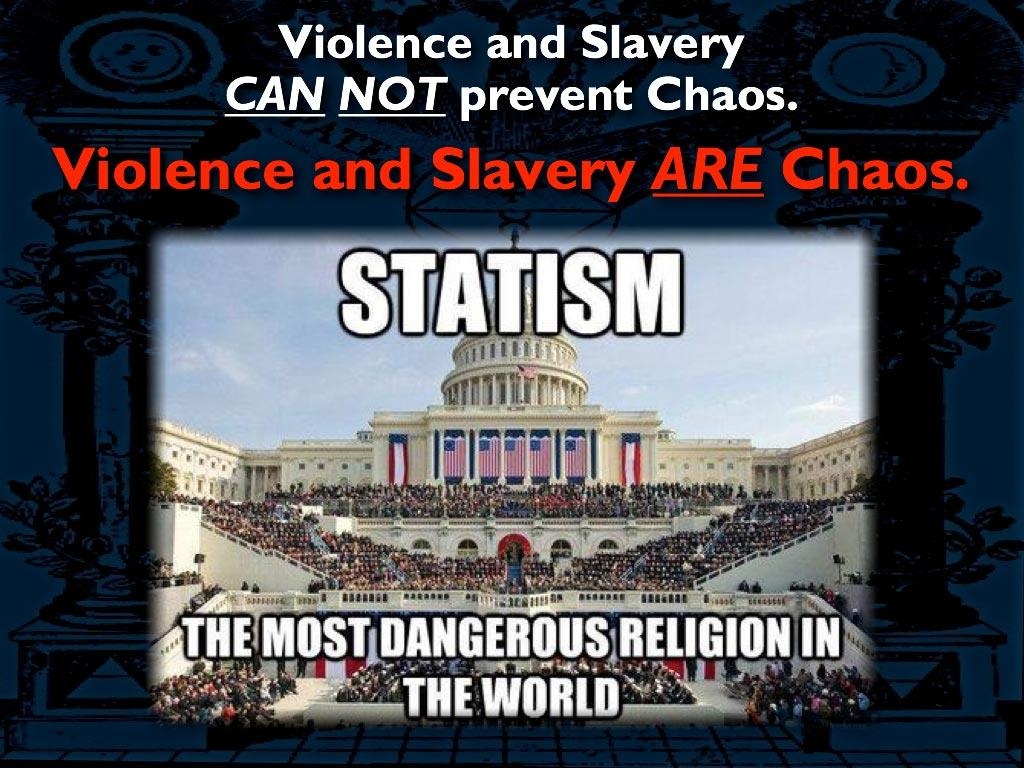
Order-followers are the people that keep the currently existent system of slavery in place; not the ruling class, not the political ‘leaders’ or ‘masters’, and not the so-called ‘elite’. The people that keep the current slavery system in place, are the people who wilfully follow orders. Which can be a difficult truth to learn, and to accept for a lot of people.
Following orders means doing what you are told to do, without judging for yourself whether or not the action you are being ordered to carry out is right or wrong behaviour. If an individual is following orders, that individual can impossibly be exercising conscience, because by definition, exercising conscience means that one is wilfully choosing for themselves right action over wrong action. Following orders should never be seen as a virtue of any kind; if you are acting based solely on what someone has told you to do, there is no morality found in that, whatsoëver. There is no such thing as morally following orders, the two terms are contradictory.
Therefore, “I was just following orders”, is never a valid excuse or justification for immoral, harmful behaviour. This sorry attempt to give up personal responsibility should never be accepted as a valid excuse for such behaviour.
The order-follower tries to abdicate their personal responsibility for their actions and pretend the blame lies with the order giver; which is an obvious lie (to themselves, mainly). They could look you dead in the eye and say, “I’m not responsible for that. I just did it; but I’m not the person who’s responsible for it, because I was acting on orders from somebody else”. It’s astonishing that they somehow truly seem to believe that statement can be regarded as true, in any way. Sadly, lots of people nowadays believe that there is legitimacy to this immoral behaviour because a group of people calling themselves ‘government’ have somehow been imbued and gifted with such ‘rights’.
The people in government believe they have rights that others don’t; but what’s even worse is that the people who are actually affected by their immoral behaviour, they believe it too.
You assist an evil system most effectively by obeying its orders and decrees. An evil system never deserves such allegiance. Allegiance to it means partaking of the evil. A good person will resist an evil system with his or her whole soul. — Mahatma Gandhi, preëminent leader of the Indian Independence Movement
Moral culpability is the determination of who is ultimately at fault, or deserving of blame for the commission of actions which resulted in harm or loss for others. The word ‘culpable’ means ‘at fault / deserving of blame,’ it is derived from the Latin noun ‘culpa’ which means ‘fault / blame’.
The people that act out a certain behaviour and cause harm, loss, chaos or trauma to others always carry blame.
Who actually carried out the holocaust in Germany? — The people that followed the orders to do so; therefore, order-followers is the answer. And they are always in the form of police or military; this is why a totalitarian state is referred to as a ‘police state’. Because they are the people ultimately responsible for bringing that condition into manifestation through their behaviour. The order giver (president / mayor / judge and so forth) makes a command, the order-follower obeys without question, and through their behaviour make that condition a reality; that’s why it’s called a police state. Because every police state that has ever existed, has always been created by police following orders. Because they don’t want to think for themselves, they don’t want the personal responsibility and they don’t want to truly know the difference between right and wrong for themselves, like a responsible adult person would.
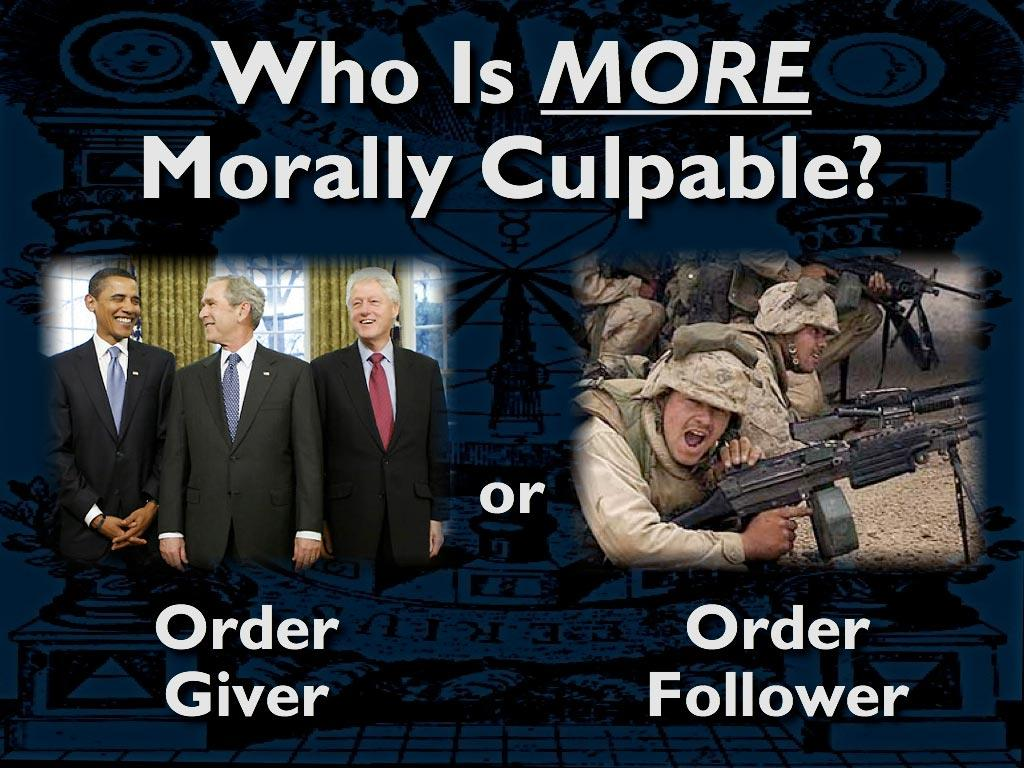
Note that in the image the term ‘more’ is underlined and capitalised; the order givers are also morally culpable, that is not the question. The question is “Who is MORE morally culpable?”. The answer is always the order-follower, at any time, in any place.
The people on the left aren’t the actual cause of what happened on the picture in the middle; all they did was sign some pieces of paper, and told the people on the right: “Go and bomb /shoot / kill these people”, and they said “Yes, sir”, and went right ahead and committed whatever wrong-doings they were commanded, without questioning at all if what they had been ordered to carry out is right or wrong behaviour.
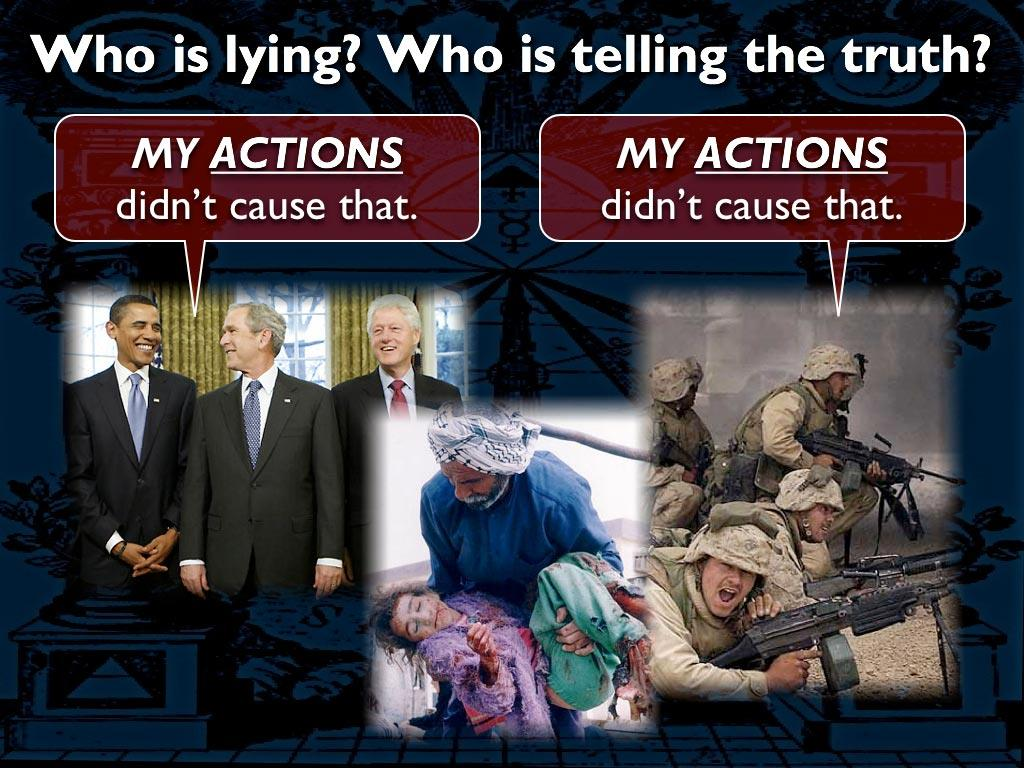
The order-follower always bears more moral culpability than the order-giver, because the order-follower is the one who actually performed the action, and in taking such action, brought the resulting harm into physical manifestation. Order-following is the pathway to every form of evil and chaos in our world, and it should never be seen as a virtue by anyone who considers themselves a moral person. Order-followers have ultimately been personally responsible and morally culpable for every form of slavery and every single totalitarian regime that has ever existed.
An individual’s personal responsibility to choose right action over wrong action for themselves is always their own. One can only (falsely) claim that they are abdicating personal responsibility for such choice to someone else, it can never actually be done in reality. It’s merely a claim when an order-follower says, “I am not personally responsible, because this person told me to do it”, which actually is a lie. More simply put, every individual is always responsible for their own actions.
Accept responsibility for yourself and your actions, thoughts and words. You alone make choices. You alone are answerable to the consequences of your behaviour. The feeble excuse that your boss required it, or the establishment expected it, holds no truth or justification. — David Icke, English Author
Lots of people erroneously believe that they can hand over their natural law right to defend themselves to another individual, or entity. In making such a false claim, they have attempted to abdicate a responsibility which always belongs to them, and can’t be wholly given away.
Those who would give up essential liberty to purchase a little temporary safety, deserve neither, and will lose both” — Benjamin Franklin, one of the Founding Fathers of the U.S.A.
People who don’t want to take responsibility and become adult human beings are in the psychological condition of ‘self-loathing’. What this means is, they hate themselves; nobody that wants to perpetuate slavery can possibly love themselves.
Self-loathing is the underlying psychological condition that causes people to attempt to abdicate their own personal responsibility to exercise conscience, and fall into patterns of order-following and justification. Just as it is not possible for an order-follower to truly be exercising conscience; it is also not possible for an order-follower to truly love themselves. These states cannot exist simultaneously, for they are contradictory psychological conditions. Self-loathing is created when an earlier trauma has been buried into the subconscious mind, instead of being confronted, dealt with, and healed. Such trauma could form feelings of inadequacy; whether they are real, suggested, or simply imagined. A mind-set as such is a psychological prison, and yet, people suffering from self-loathing usually don’t seem to have any desire for true freedom: “they are in the cage, and they love being in the cage”. The only kind of people that have no desire for real freedom, are people in the psychological state of self-loathing, that do not love themselves.
Self-respect heals self-loathing; it is about introspection (observation or examination of one’s own conscious thoughts and emotional state). The word ‘respect’ is derived from the Latin prefix ‘re-’ which means ‘again’ and the Latin verb ‘spectare’ which means ‘to look at’. To ‘take another look at oneself’ is where true respect starts. You cannot give somebody something that you don’t already own yourself. If you don’t have ten dollars in your pocket you could not possibly give it to someone else. You must obtain it first, before you can give it away. Therefore, nobody can give respect to anybody else unless they first developed it inwardly. Self-respect must come first, which is why people in the state of self-loathing don’t respect anybody, least of all themselves. Only self-respect can heal self-loathing, and therefore help put an order-follower on the path to exercising conscience.
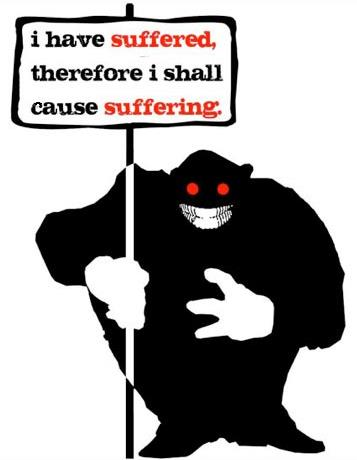
The lost word is a concept in esoteric Freemasonry which represents a state of consciousness that has been largely ‘lost’ to the majority of people. In order to speak the lost word, a person must work upon themselves in order to achieve a state of equilibrium (balance) between the left and right brain hemispheres. In such a state of balanced consciousness, the individual has come to know the self (microcosm), as well as the working operations of natural law (macrocosm), and in doing so has come to understand the objective difference between right and wrong behaviour. Or as they are referred to in Freemasonry, ‘light (knowledge)’ and ‘darkness (ignorance).’
In the balanced state of consciousness generated through the knowledge of natural law, a person is finally able to speak the lost word, which is: ‘no.’ In Freemasonry it is considered to be the word of all power. When we say no to those who claim to be our owners, those who claim that they will decide which rights we have or do not have, only then do we stop externalizing our power to anyone outside of ourselves and in doing so, reclaim all of our rights (all of our property). Sadly, very few people in our world have the knowledge, care, and courage that is required to do this. That is why this powerful word is considered to be ‘lost’.
Know your rights. — The reason you have to know what the difference between right and wrong is, and therefore know what rights you have and which you do not have, is because those who don’t know, won’t say no (to somebody who claims to be their owner).
Education is the only solution, knowledge is the solution; and the propagation of that knowledge is ‘education,’ which means ‘to lead out from’. The Latin verb ‘educere’ means ‘to take / to draw / to lead out from’. Leading a person out of darkness (ignorance) is what a real teacher does. Rather than ‘pushing’ a person out of that darkness, the teacher will go first and show that person the way, and if he or she feels it is the accurate path, that person can follow the same discovery process. However, it must be a repeatable process; as was mentioned earlier, natural law isn’t a religion or a belief system, it is a science.
A ‘quantum shift’ in human consciousness is required for humanity to become free of its self-imposed state of slavery. Unfortunately, this great change is not an automatic process, nor is it guaranteed to happen at all. Anybody who thinks that’s the case is very naïve, overly positive, and in some form of right-brain imbalance. Whether or not this shift will occur mainly relies on the human will to learn the truth and teach it to others. This involves enormous effort, dedication, and persistence. We cannot give up. There is a saying in Alchemy that has been referred to as the ‘catchphrase of the alchemical tradition’ the saying goes: ‘labore et constantia’ which means ‘work and constancy’. Constant effort is going to be required to get this boulder up the mountain, and in the condition in which humanity finds itself today, it will most likely go kicking and screaming. Teaching natural law to others is not an easy task, it usually isn’t fun, and we’re definitely not going to get it done in a day. Therefore, we are going to have to continually work hard on this matter, or the quantum shift simply will not happen at all.
A quantum shift has requirements:
The word quantum is derived from the (same) Latin noun ‘quantum’ which means ‘amount.’ In order to tip the scales of truth and justice back into balance, a certain amount of people actually need to be doing the great work of helping other people to receive this knowledge of natural law. Simply put, higher amounts of people are required.
Individual behavioural choices, either based in harmony or in opposition to natural law, combine in energy and effect, and in the aggregate, influence the quality of the manifested shared human experience; we collectively create our shared experience. This dynamic acts as a perfect expression of the principle of correspondence: “As above, so below; as below, so above”. Decisively contrary to the ‘new age’ view. In order for a quantum shift to happen, once again, higher numbers are required.
The great work can only be performed after one has already realised the truth regarding natural law, and brought oneself (one’s own actions) into alignment with it. From that moment on, the teaching of the great work can begin; because once that has been done, there is no more internal contradiction or opposition within that person. From there on out, you can legitimately start teaching it to other people because you know it deeply enough, and have truly aligned your behaviour to it. The great work is what comes next. The great work is the arduous task of influencing other people to go through that same process of positive change, that you have gone through yourself. It is to help them realise that in supporting and condoning the legitimacy of ‘authority’ and ‘government’ (man’s law), they have actually been supporting and condoning the legitimacy of slavery. And that they were immoral for having done so; convincing a person of that is hard work. Because people usually don’t want to hear this, they want what they think is true, to be true.
In short, what the great work comes down to is to get people to abandon their (false) religions. The false and dogmatic beliefs which hold back the progress of consciousness by impeding the reception of knowledge of natural law.
The Swiss psychotherapist Carl Gustav Jung described the great work beautifully:
One does not become enlightened by imagining figures of light, but by making the darkness conscious. The latter procedure, however, is disagreeable, and therefore, not popular. — C.G. Jung
The true great work is to become a teacher of natural law; and as the old saying goes ‘many hands make light work.’
Educate and inform the whole mass of the people. That is the only sure reliance for the preservation of our liberty. — Thomas Jefferson, 3rd President of the U.S.A.
In every declining civilisation there is a small remnant of people who adhere to the right against the wrong; who recognise the difference between good and evil and who will take an active stand for the former and against the latter; who can still think and discern, and who will courageously take a stand against the political, social, moral and spiritual decay of their day. — excerpt from the book ‘Toward a New World Order’ by Donald S. McAlvany
Do not suppose that I have come to bring peace to the Earth. I did not come to bring peace, but a sword. For I have come to turn a man against his father, a daughter against her mother, a daughter-in-law against her mother-in-law. A man’s enemies will be the members of his own household. Anyone who loves his father or mother more than me is not worthy of me. Anyone who loves his son or daughter more than me is not worthy of me. And anyone who does not take his cross and follow me is not worthy of me. Whoëver finds his life will lose it, and whoëver loses his life for my sake will find it. — Matthew 10:34–39
Jesus is telling you that there will be people in your own family who will not align themselves with right over wrong behaviour, they will continue to choose, and to advocate violence and slavery. These are not people you want to continue to align yourself with, if you have truly made an effort to explain what is really taking place.
“Do not let your hearts be troubled. You believe in God [Creator of the universe]; believe also in me [Truth]. My Father’s house has many rooms; if that were not so, would I have told you that I am going there to prepare a place for you? And if I go and prepare a place for you, I will come back and take you to be with me that you also may be where I am. You know the way to the place where I am going”.
Thomas said to him, “Lord, we don’t know where you are going, so how can we know the way?”.
Jesus answered, “I am the way and the truth and the life. No one comes to the Father except through me. If you really know me, you will know my Father as well. From now on, you do know him and have seen him”.
Philip said, “Lord, show us the Father and that will be enough for us”.
Jesus answered, “Don’t you know me, Philip, even after I have been among you such a long time? Anyone who has seen me has seen the Father. How can you say, ‘Show us the Father’? Don’t you believe that I am in the Father, and that the Father is in me? The words I say to you I do not speak on my own authority. Rather, it is the Father, living in me, who is doing his work. Believe me when I say that I am in the Father and the Father is in me; or at least believe on the evidence of the works themselves. Very truly I tell you, whoëver believes in me will do the works I have been doing, and they will do even greater things than these, because I am going to the Father. And I will do whatever you ask in my name, so that the Father may be glorified in the Son. You may ask me for anything in my name, and I will do it.”
— John 14:1–14
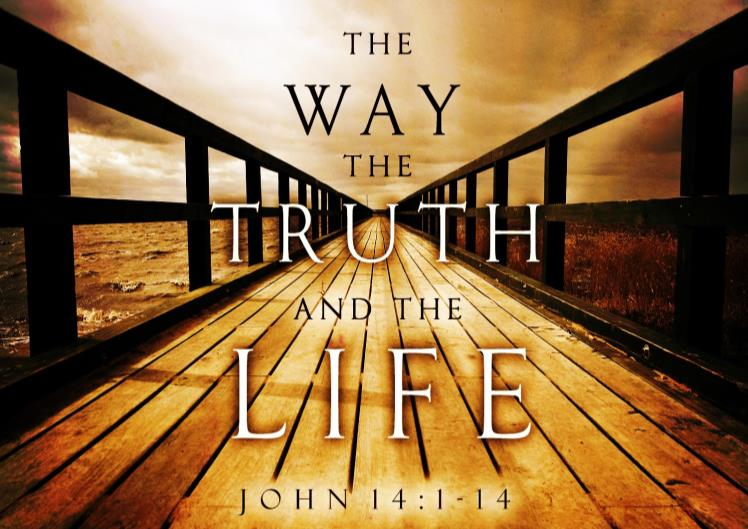
The personal ‘battle’ that must take place will be against the inner demons which exist within the psyche of humankind, namely:
Negative ‘knowledge’: The greatest enemy may not be ignorance, but rather the illusion of knowledge. When a person dismisses information simply because they think they already know it, or think it isn’t important. Not only are they not at the starting point for truth discovery; because they are already attached to information that isn’t true. They are put in a negative starting position because they must first unlearn the information they have been conditioned to believe, to even get to the actual starting point. This happens when a person is in left-brain imbalance.
Emotional mind control: “If it’s unpleasant, I don’t want to hear it, I don’t want to see it, and I certainly don’t want to tell others about it! I’ll just ignore it, and it will go away”. What happens when you would do that with, for example, an illness, or any other problem? It doesn’t tend to get better, it only gets worse. Another form of emotional mind control is when a person dismisses information solely because that person dislikes the way the information is being presented, or delivered to them. You cannot determine the veracity of informational content based on how it makes you feel, doing so is a logical fallacy; you cannot ‘think’ with the emotions. While emotions are also extremely important (our ‘compass’ for morality), you can’t thoroughly analyse and conclude what’s true based only on how something makes you feel. If you are told a lie in a sweet, pleasant and soothing voice, it’s still a lie. If you are told a truth in an abrasive, harsh and scratchy voice, it is still truth.
Truth is belligerent. Truth is, by its very nature, at war with the forces of falsehood and deceit. — Bertolt Brecht, German Poet
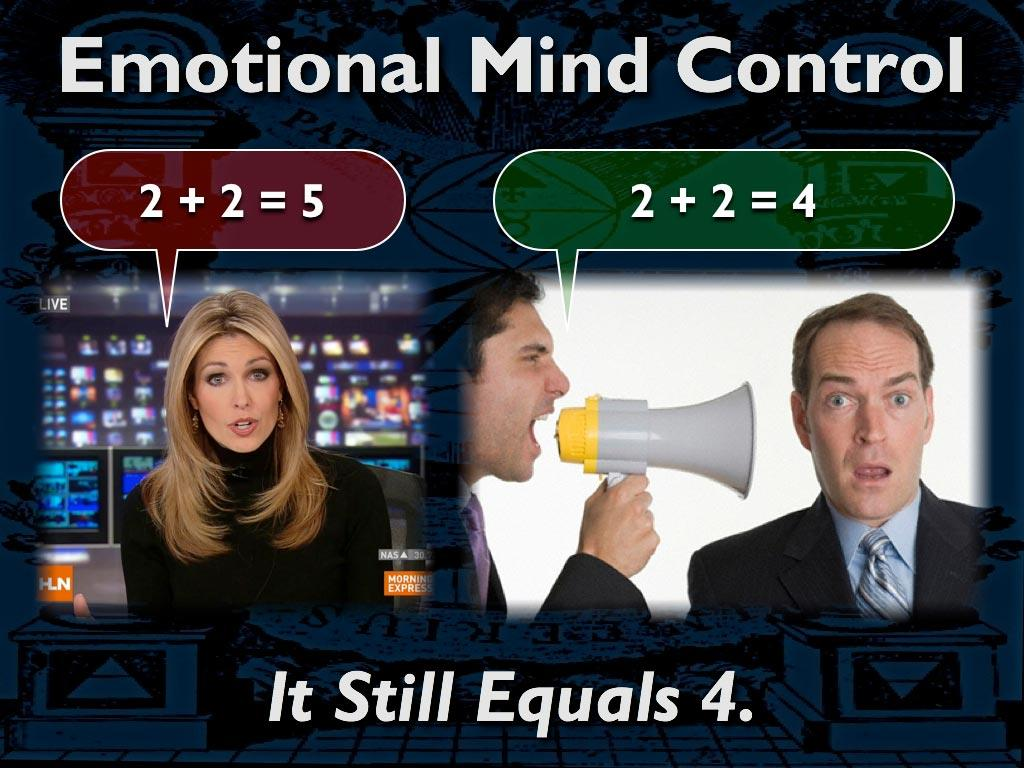
Fear of true freedom: Where does the fear of true freedom come from? From the refusal to own personal responsibility (symptom of the problem).
Caused by:
Self-loathing due to lack of self-respect (heart of the problem): What kind of people want to live in perpetual refusal to their personal responsibility, because they have nested traumatic issues that have led to self-loathing and lack of self-respect? — Young children. People that are psychologically, emotionally and spiritually immature; they haven’t grown up. Therefore, they don’t accept personal responsibility, something that is regarded a hallmark of true adulthood and maturity. This is due to a trauma they have undergone, that has led to self-loathing, and the lack of self-respect.
Until we start to figure out the causal factors of the other manifesting psychological conditions listed above, we are merely dealing with the symptoms, not the root of the problem. If a child doesn’t like itself, and they feel they are ‘not good enough’ or ‘not worthy’, all these imagined feelings of inadequacy and self-loathing arise. Those are usually the factors that cause their refusal to grow up, and their refusal to take personal responsibility for their actions during adulthood. What specific type of childhood trauma has this child, most likely, gone through?
Caused by:
Abandonment issues (root of the problem): The human species is suffering from very deep-seated parental abandonment issues, that lie at the very core of our global psychological condition; the human condition.
Until we deal with that deeply nested psychological trauma, we aren’t dealing with the actual root cause of the problem, and we won’t get any closer to solving it.
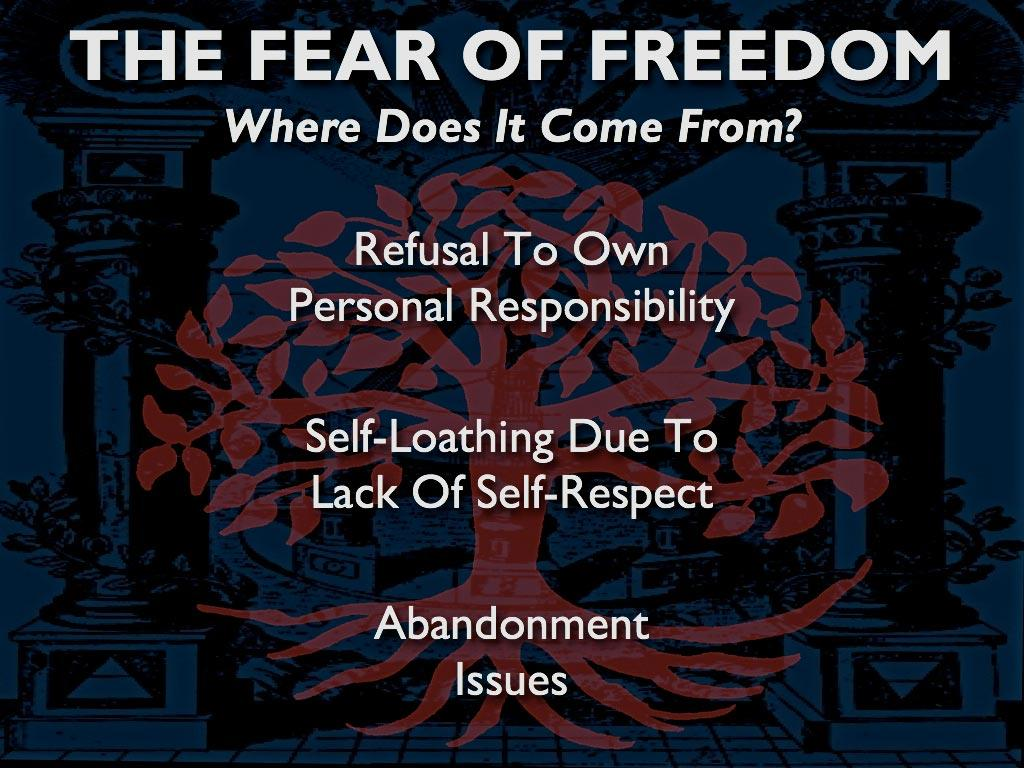
Knowledge of the real enemy: The real enemy is the ignorant masses. There are people that say: “The Illuminati enslaves humanity”. Which is not at all the case; humanity enslaves the real Illuminati (the ‘illuminated (enlightened)’ ones). If that term is to be used for anyone, it makes more sense to apply it to actual teachers of natural law, the people that know and understand what is written about in this thesis are the real “illuminati”. They are the real “enlightened” ones; the ones with the light, the ones with the knowledge of natural law. Humanity is enslaving itself, and also the true Illuminati: the teachers that are actually living under the conditions of slavery because they are here with the ignorant masses. It almost seems as if people prefer to think: “we’re powerless victims, there is no choice involved here, this is something that is just being done to us”. While free will is always in existence, and it’s a matter of changing one’s thoughts, and therefore changing one’s choices. And that is our own personal responsibility which can never be given away. Once more, you are always responsible for your own actions.
Service to truth: Truth can never be destroyed. But humanity can definitely be destroyed, if we refuse to act in service to truth as its defenders. There are people that think truth doesn’t need to be defended, which is simply not true. Truth needs to be fended for at all times and places, because the attack on it is never-ending and non-stop. If we do not come to defend truth; the voice of untruth and deception rules the day, and the voice of truth will not be heard. Since the truth doesn’t have its own voice in our physical domain, we must act as its mediums and literally be its voice. It is definitely possible for us to cocreate a positive outcome, but this can only be accomplished if we care enough to learn the truth ourselves, and then develop the courage to speak it to other people.
If you love wealth greater than liberty, the tranquillity of servitude greater than the animating contest for freedom, go home from us in peace. We seek not your counsel, nor your arms. Crouch down and lick the hand that feeds you. May your chains set lightly upon you, and may posterity forget you were our countrymen. — Samuel Adams, one of the Founding Fathers of the U.S.A.
Persistence: We are the vehicles by which truth operates in our world. Therefore, it is our shared responsibility at this time to help to awaken others by continuously speaking the truth, even if we feel burdened by this task, even if we feel that nobody is listening, and even if it makes all people involved feel uncomfortable. Nobody ever said that the truth is going to make you feel warm and fuzzy inside; the truth can be horrible, and yet, it needs to be embraced as a lover.
There are only two mistakes one can ever make on the path to truth: not starting, and not going all the way” — attributed to Buddha, religious leader
Lastly, we need practical real-world skills. The end goal isn’t to have you just knowing this information for yourself; but to communicate this information to the masses. And to be able to communicate truth to others properly, knowledge and certain skills are required.
Technology is something that improves life for us, and makes life easier for us. In this technological era we live in, it is absolutely crucial that we learn to use this technology as our tools for communication of truth.
Some examples of those practical skills are:
If most of us do not have these skills, we won’t be reaching the optimum number of people. We have to become the new media, that is dedicated to truth, and put it out there for other people’s edification.
When we deeply understand knowledge as important as this, we almost have a moral obligation to share it with others; what gives us the right to keep it to ourselves? If it can greatly improve our own lives, and the lives of those around us. If you keep taking in more and more knowledge, you’re building up more and more pressure within yourself. If you don’t have an outlet valve for that pressure, you become “Niagara Falls inside a water balloon”: one day, it’s going to burst.

The Dark Ages still reign over all of humanity, and the depth and persistence of this domination are only now becoming clear. This dark age prison has no steel bars, chains, or locks. Instead, it is locked by disorientation and built on misinformation. Caught up in a plethora of conditioned reflexes and driven by the human ego, both warden and prisoner attempt meagrely to compete with God. All are intractably sceptical of what they do not understand. We are powerfully imprisoned in these dark ages simply by the terms in which we have been conditioned to think. — Richard Buckminster Fuller, American Inventor
The conditioning of our thoughts is what has kept us in this prison, and only now are some people beginning to see the actual depth of it. We are living in ‘post-apocalyptic’ times, in the literal sense of the word. The word ‘apocalypse’ is derived from the Greek prefix ‘apo- (απο)’ which means ‘away from / off / removed from’ and the Greek verb ‘calyptein (καλυπτειν)’ which means ‘to cover / to conceal’, hence the word apocalypse literally means ‘to reveal’ or ‘to take out of hiding’. Therefore, the apocalypse simply means the revealing of truth. The veil has already been lifted, and the truth about what has been, and still is going on here on Earth is already out there, and available for most people to find.
We have to make, what has been called ‘The Cosmic Apology’. The word ‘apology’ is made up of the Greek prefix ‘apo- (απο)’ which means ‘away from / off / removed from’ and the Greek noun ‘logos (λόγος)’ which means ‘word’. Hence apology literally means ‘to go away from the word’ (to take back something you said), or ‘to give back the word’. If a person says something they didn’t really mean, or something they want to retract, they apologise; they are “moving away from” what they have said.
The Greek noun ‘logos’ is derived from the Greek verb ‘lego (λεγω)’ which means ‘to speak / to say’ (this is where the English word ‘lexicon’ comes from. The Latin noun ‘lex / legis (Law)’ is also derived from this same Greek verb. God, not man, is the author (authority) of law; the one who brought the law into existence. Humanity’s work is to learn to listen to God’s word, which is, natural law, spiritual law, moral law, God’s law; and to align its behaviour to that law. Humanity must make this cosmic apology by giving the word (authorship of law) back to God, and collectively aligning its behaviour with natural law. This is accomplished when we open our minds and hearts to truth, and when we start saying the lost word ‘no’ to those who claim to be our owners.
The very beginning of this thesis started out with the chapter ‘Before we begin’. Now we have begun, and it’s up to you to take it further. What you will eventually do with this knowledge is entirely in your hands.
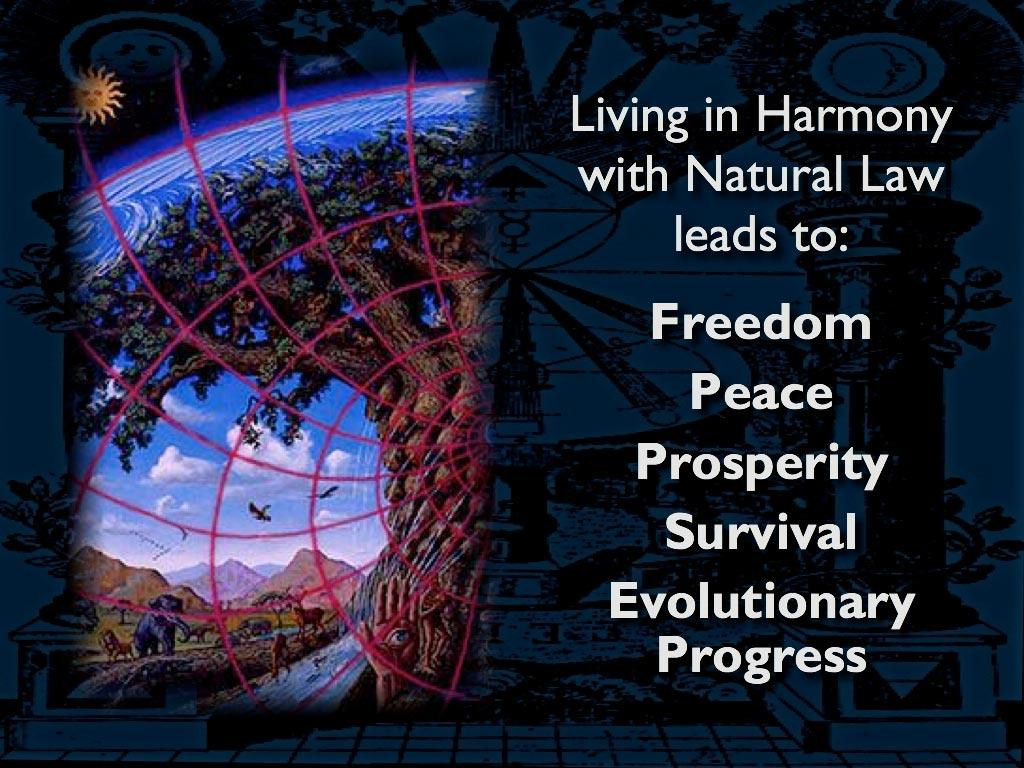
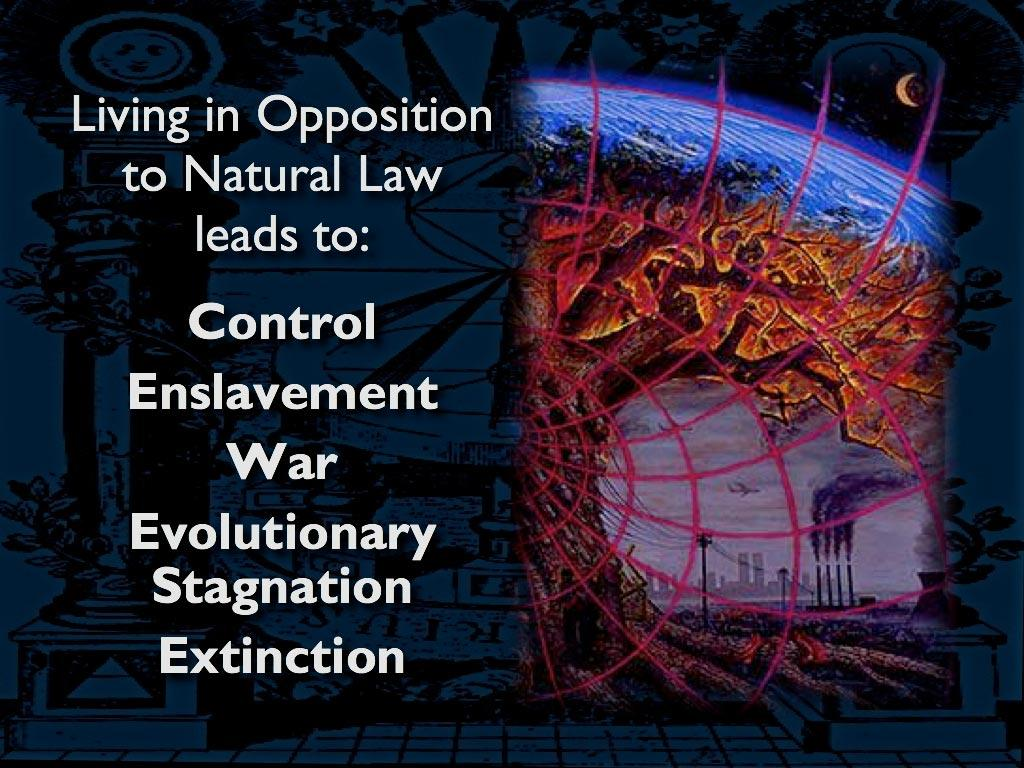
Which of the two will we choose? There is no answer to that question yet. Each individual has to make that decision for themselves, and that will eventually be expressed in the aggregate.
A free people claim their rights as derived from the laws of Nature, and not as the gift of their magistrates. — Thomas Jefferson, 3rd President of the U.S.A.
The natural liberty of man is to be free from any superior power on Earth, and not to be under the will or legislative authority of man, but only to have the law of Nature for his rule. — John Locke, English philosopher
Nature, to be commanded, must first be obeyed. — Francis Bacon, former Attorney General and Lord Chancellor of England
If we want the forces of Nature on our side we must learn, and adhere to, the principles of natural law. If we do not align our behaviour to it, Nature will not stand with us, but will continuously stand against us, and that will create more strife and suffering in our lives.
There is a law that man should love his neighbour as himself. In a few hundred years it should be as natural to mankind as breathing, or the upright gait. But if he does not learn it, he must perish. — Alfred Adler, Austrian Psychologist
This process should be able to be done a lot faster than a few hundred years; if we accept the key that is shown in this thesis. Which has the power to unlock all the locks, and all the doors, to all the mental cages, if we make the decision to climb the ‘ladder of consciousness’ through an act of our own free will choice and effort. Because for most it won’t be an easy process; it involves a lot of deep introspective work. However, if we do this work, we can step out of the prisons we have imposed upon ourselves, by balancing the sacred feminine and sacred masculine forces within each one of us. And by recognising our own inherent sovereignty, and recognising there isn’t, and never has been, any legitimacy to slavery, control, authority or any other form of external rulership of human beings as subjects.

The tarot card pictured here was also shown at the beginning of this thesis. There is a deep connection to be understood about the tarot tradition and other mystery traditions regarding knowledge of natural law. Specifically, the deeply interwoven relationship to the middle-eastern Kabbalistic tradition.
This tarot card is known as the Justice Card (Justice: based on the Latin word ‘jus’ meaning ‘Right or Law’) This card represents balance between the two pillars of enlightenment (feminine / masculine). Justice holds the sword of truth in the right hand, and the scales of justice perfectly balanced in the left hand. It represents sovereignty, alignment with truth, and the manifestation of order, which can only happen when we align our behaviours to the principles of natural law.

If we let go of the habits that are holding us back and break the mental chains of bondage, we can create a world that is based on true freedom. It may be a difficult journey, but it can be done. And if we all choose to do so, we’re going to see advances and creations beyond what we have ever experienced here on Earth. The world will look so drastically different if we go down that middle path to truth, order, and justice; the understanding, and applying of natural law. The changes we will experience are going to be so positive, and so transformative that we can barely even imagine what the world will look like on the other side of that work.
It is up to each and every one of us, personally, to take on that responsibility and go down that path for ourselves; should we hope to ever reach that point.
The main task now is to inform as many people as possible about the workings of natural law, true morality, and freedom. Always remember, ‘The Law is King’.
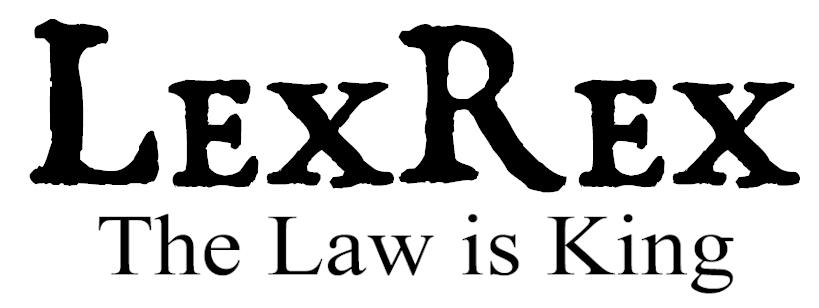
Most of these books can be found in pdf file format for free on the internet. But please consider buying a physical copy, or making a donation to the authors for their work.
And please consider doing the same for Mark Passio, this thesis is based in its entirety on a single presentation of his. All of his other presentations are well worth watching as well. They can all be found on YouTube, or on his website whatonearthishappening.com, where he also does a weekly video podcast on topics related to natural law, and many other subjects of importance to achieving human freedom.
Natural law is a set of universal, objective, eternal, non-man-made, binding and immutable conditions which govern the consequences of behaviours of beings with the capacity for understanding the difference between harmful and non-harmful actions. The understanding of natural law is centred upon bringing one’s own conscience into alignment with objective morality. This means definitively knowing which behaviours are rights; because they do not cause harm to other sentient beings, and which behaviours are wrongs because they do cause harm to other sentient beings. Living in harmony with natural law means exercising conscience, and wilfully choosing morally right behaviour over morally wrong behaviour, once the difference between the two is clearly understood.
When people begin to live in harmony with natural law in the aggregate, and are therefore moral, they become and remain free. When people live in opposition to natural law, and are therefore immoral, they become and remain enslaved.
If you want to come to a proper understanding of what natural law is exactly, and how it works in the world around you. If you wonder how it came to be that relatively small groups of people calling themselves governments control the lives of billions of people worldwide. If you want to definitively know the difference between right and wrong behaviour, and make a positive change in your own life and the lives of the people around you, this will be of interest to you.
If you have any questions regarding any of the topics written about you can send me an e-mail, and I’ll get back to you as soon as I can.
Please feel free to share this thesis with as many people you like.
Thank you.
Contact: michaelgleeson@mail.com